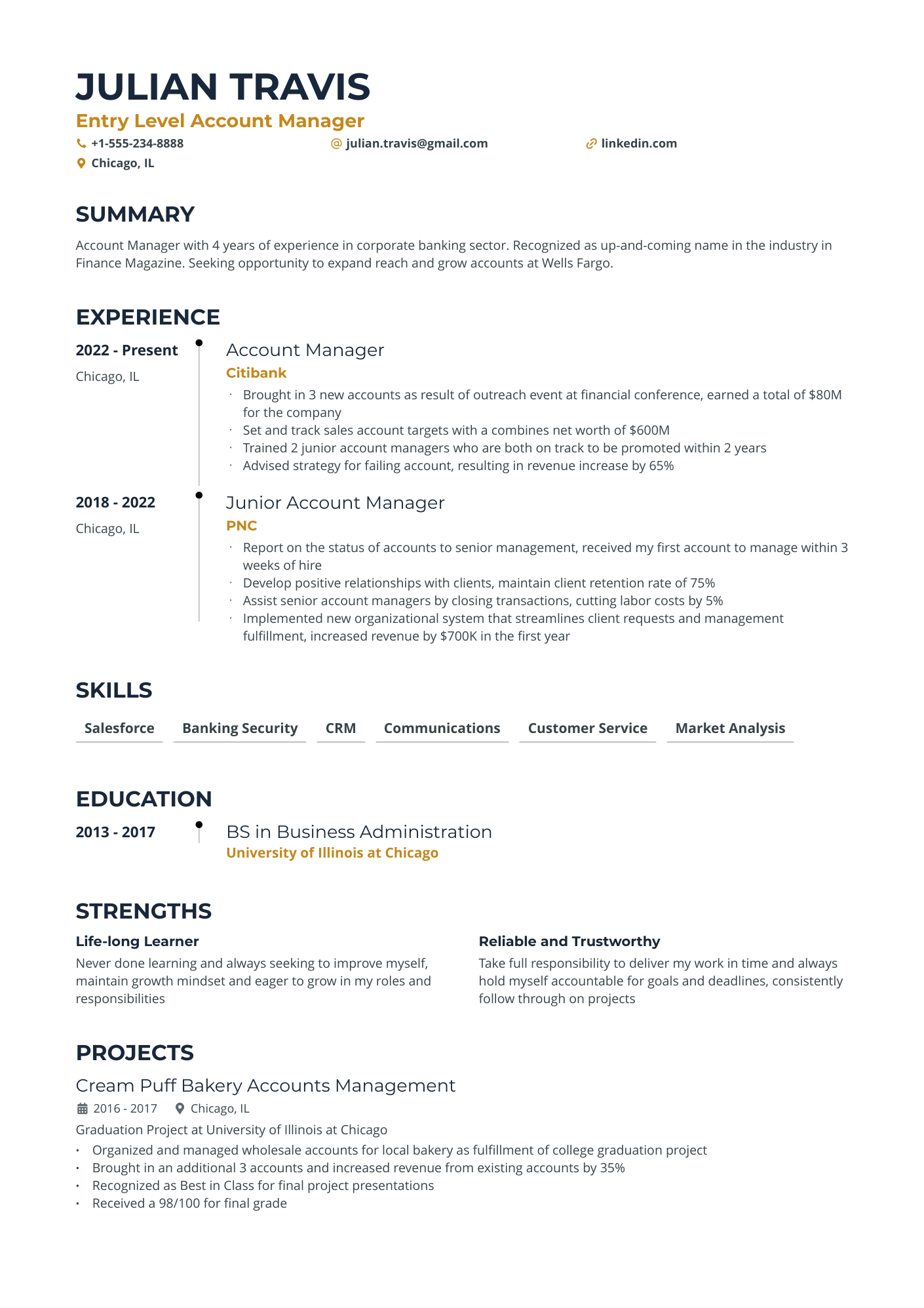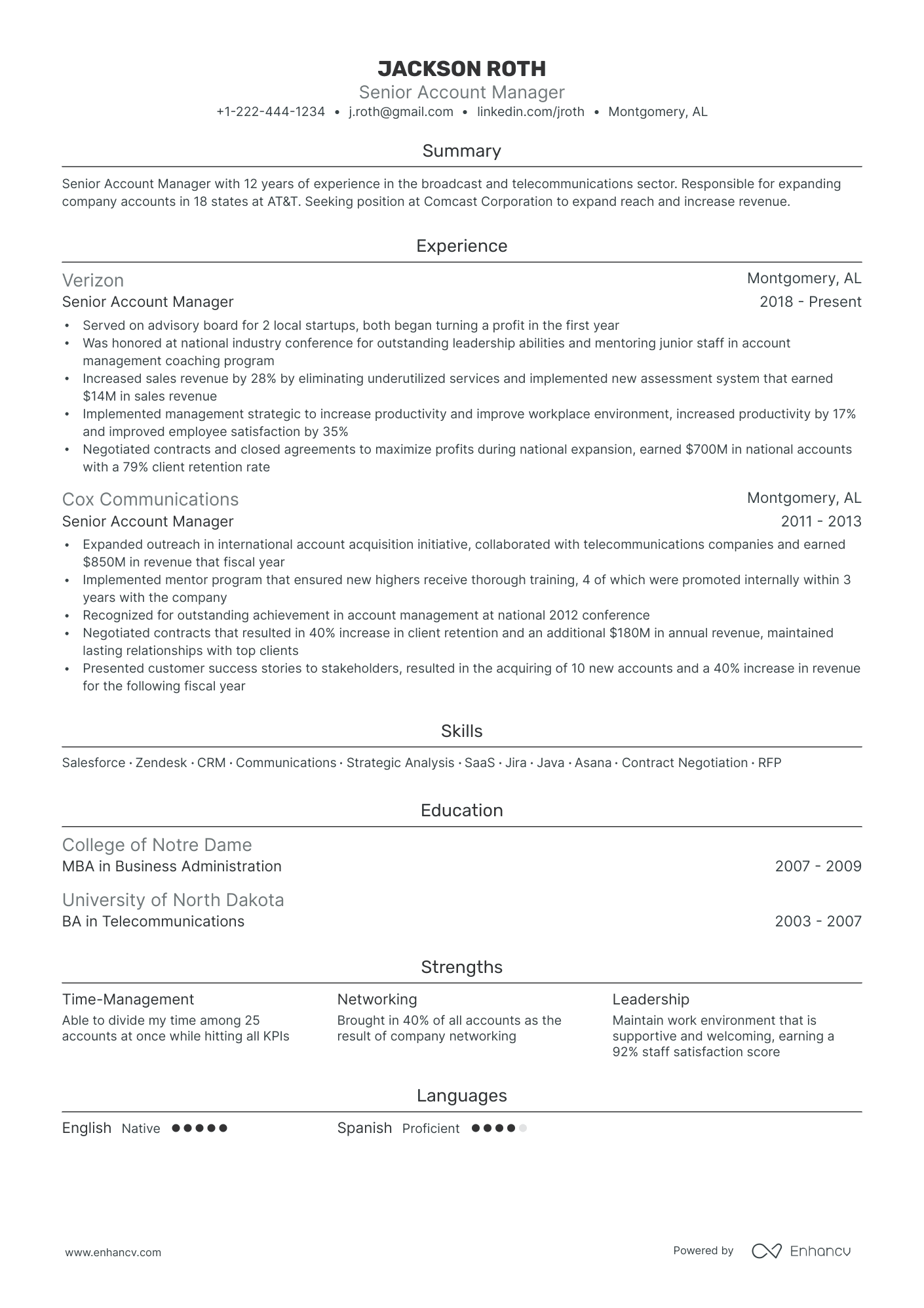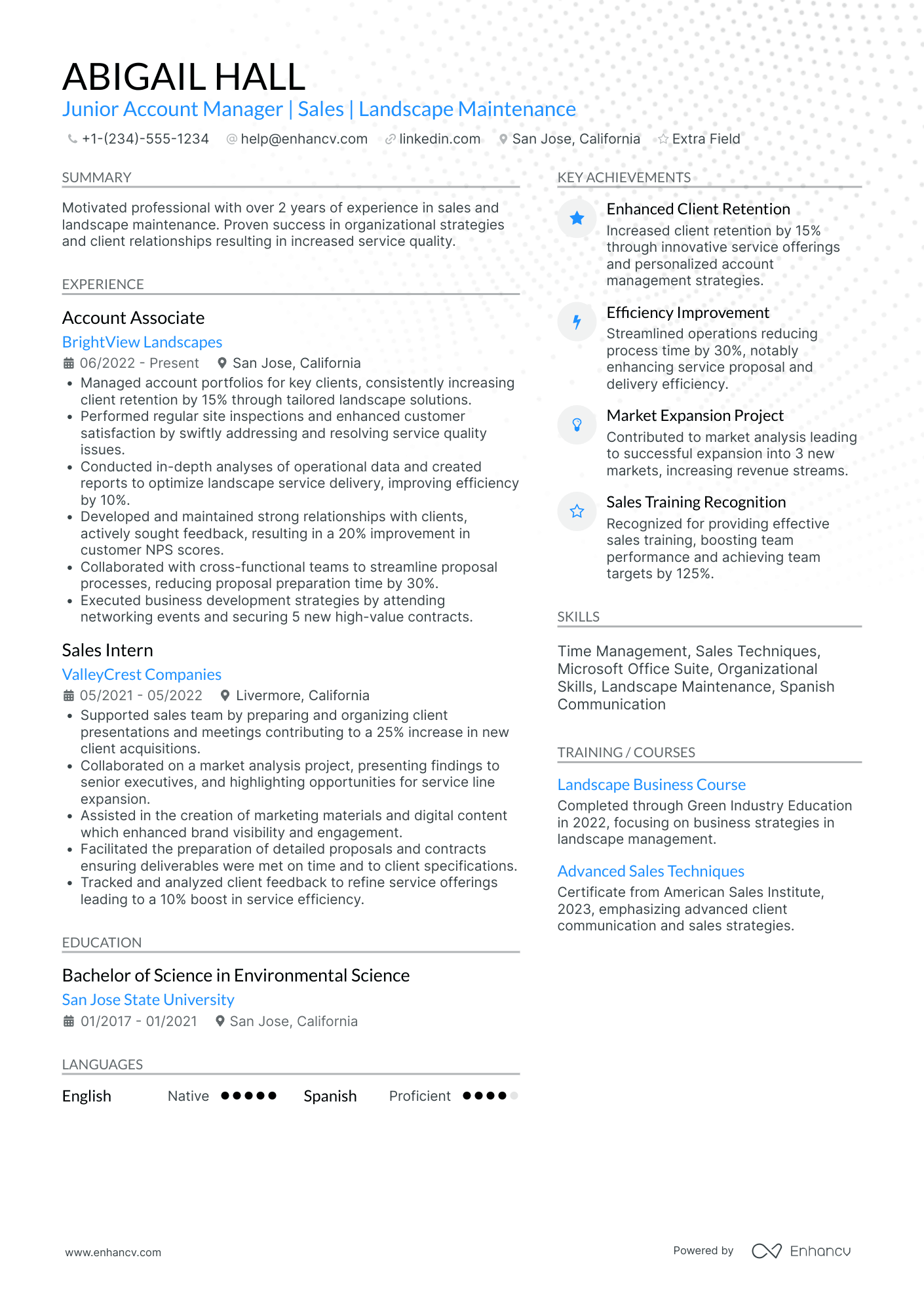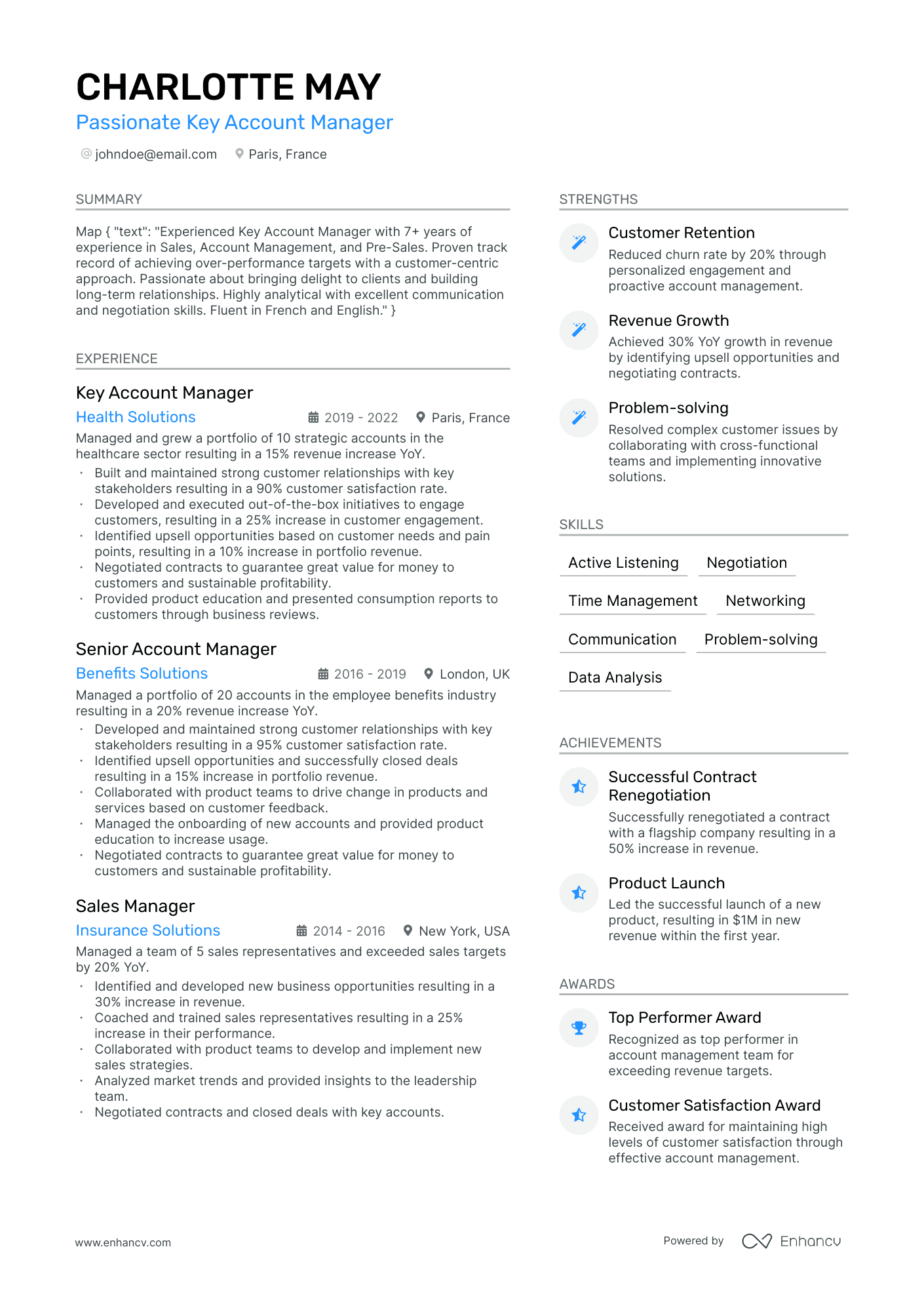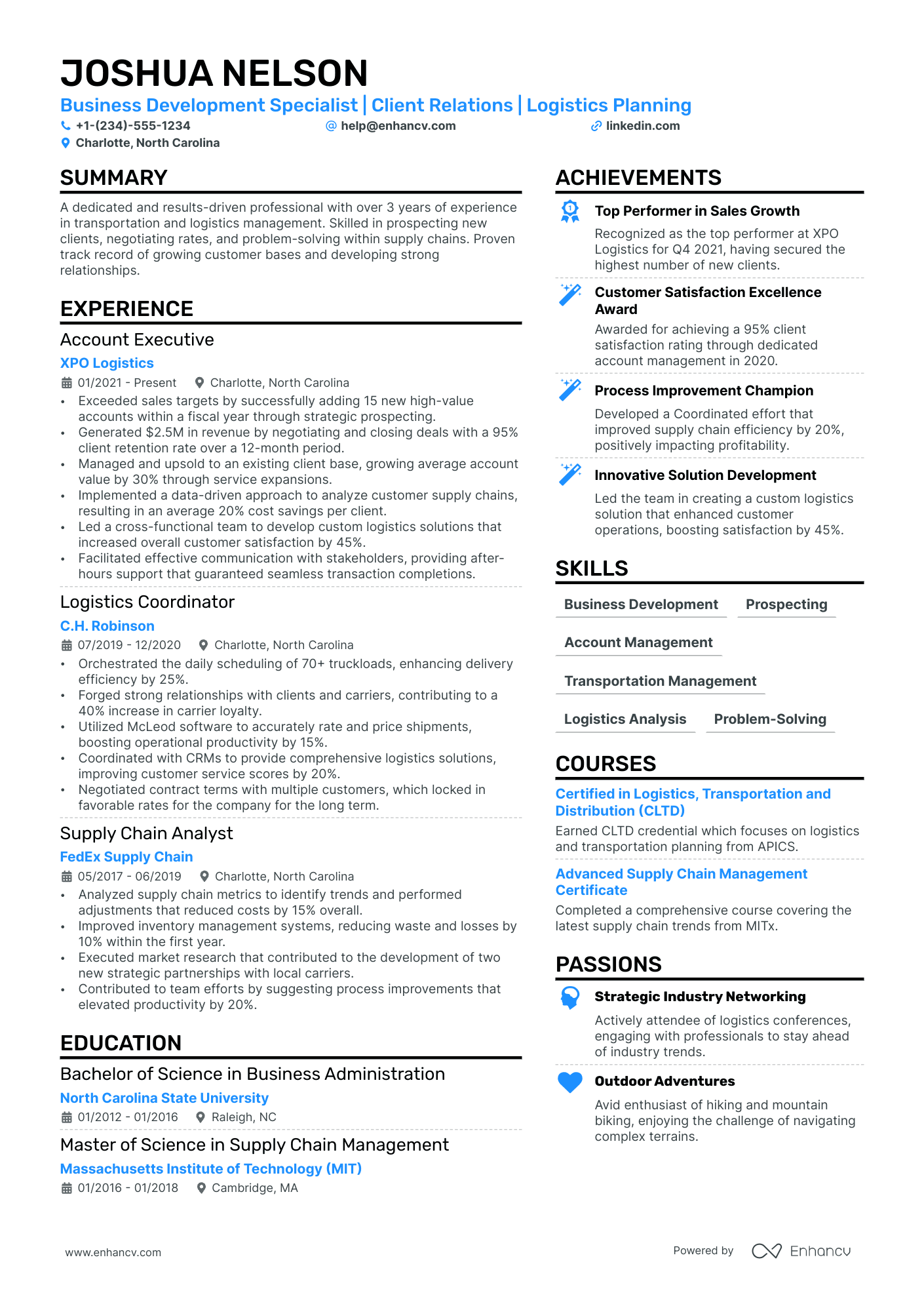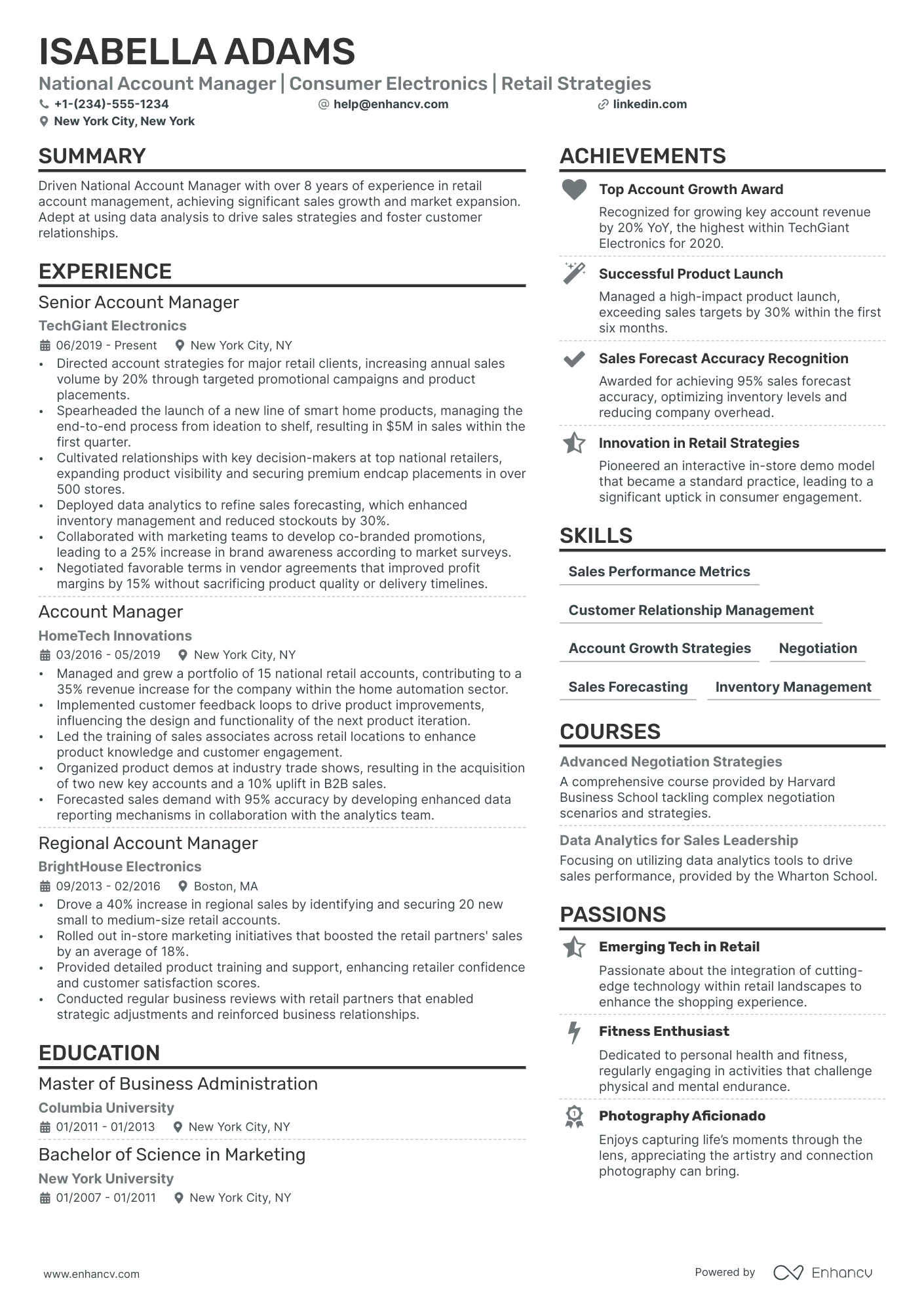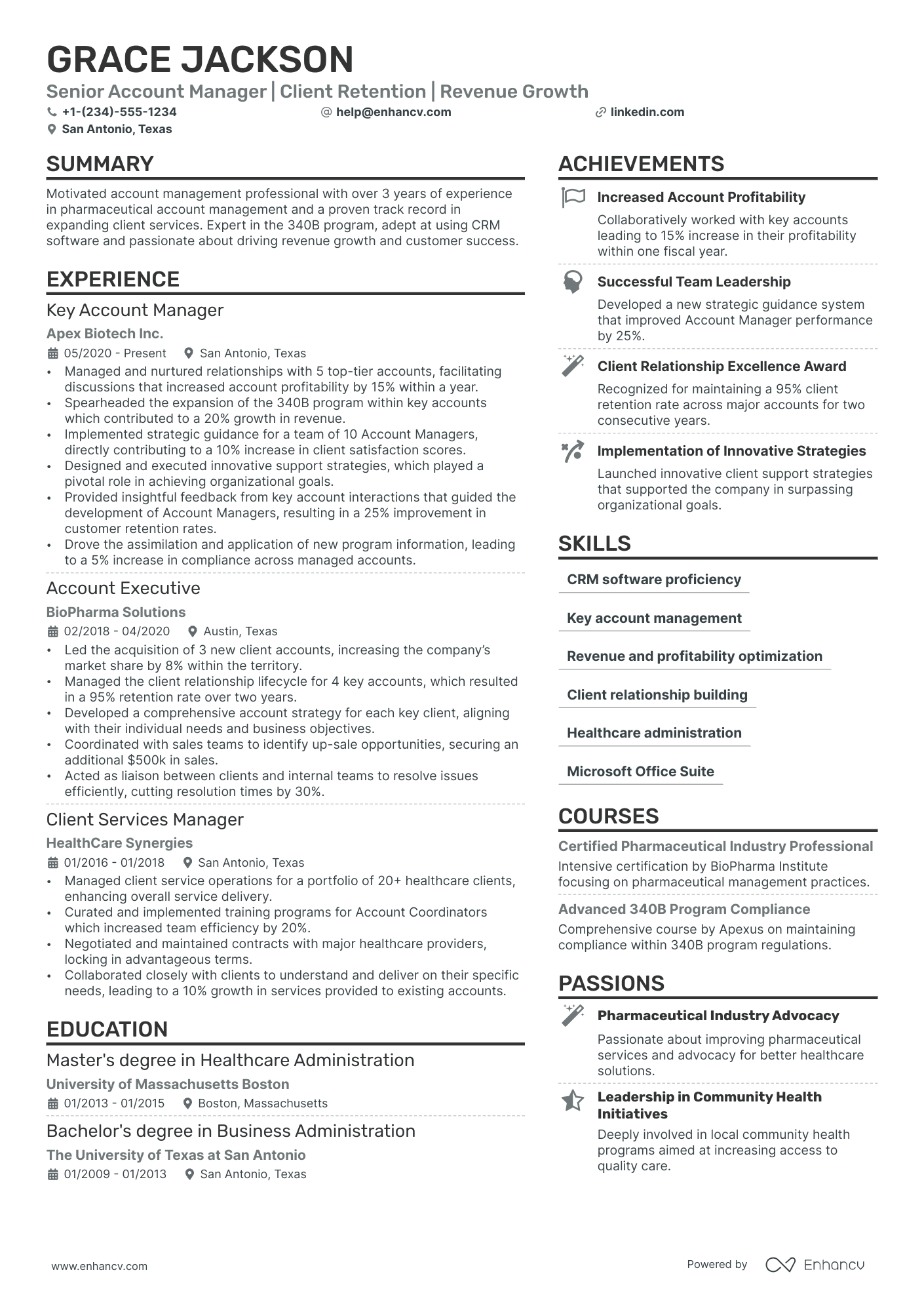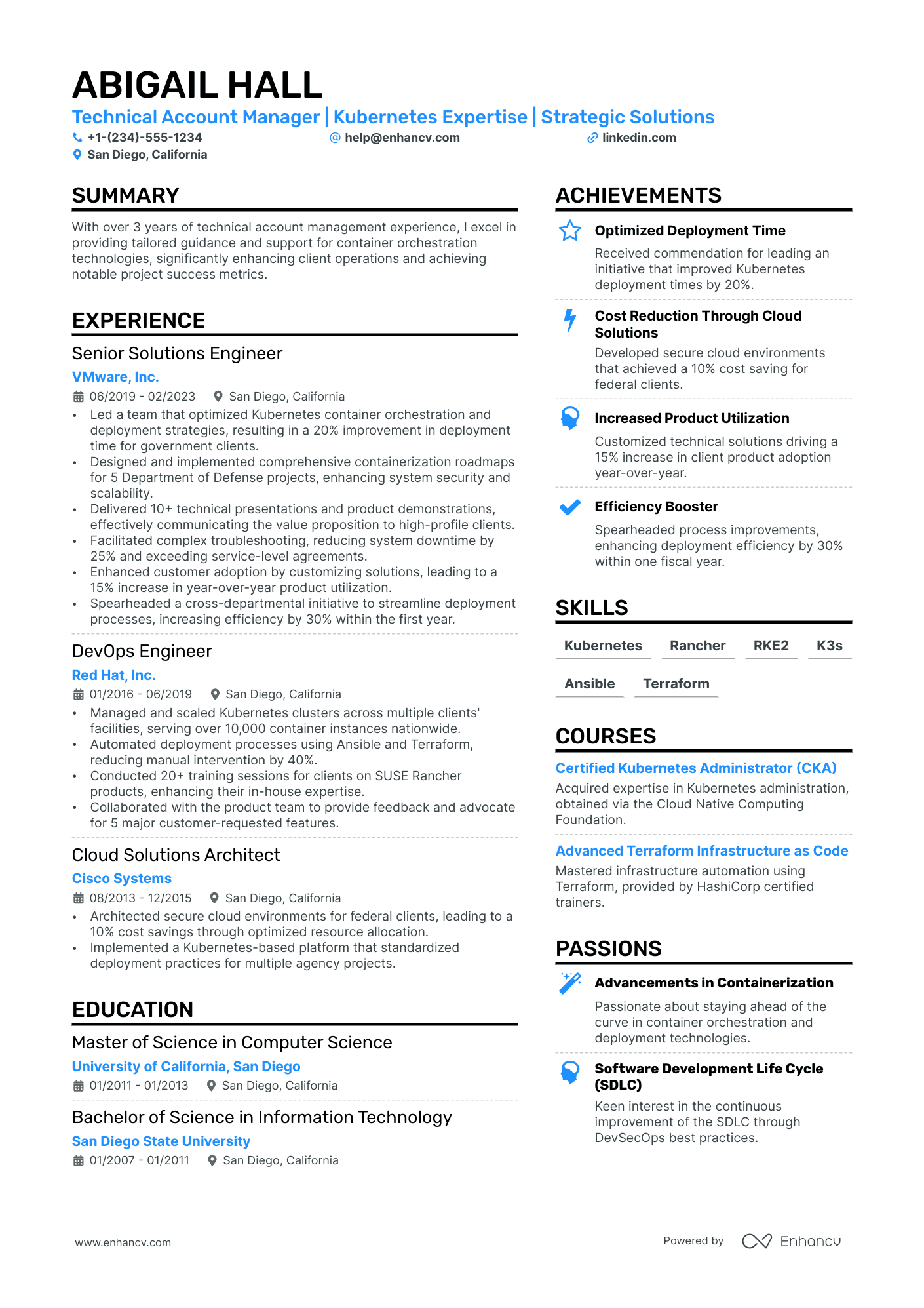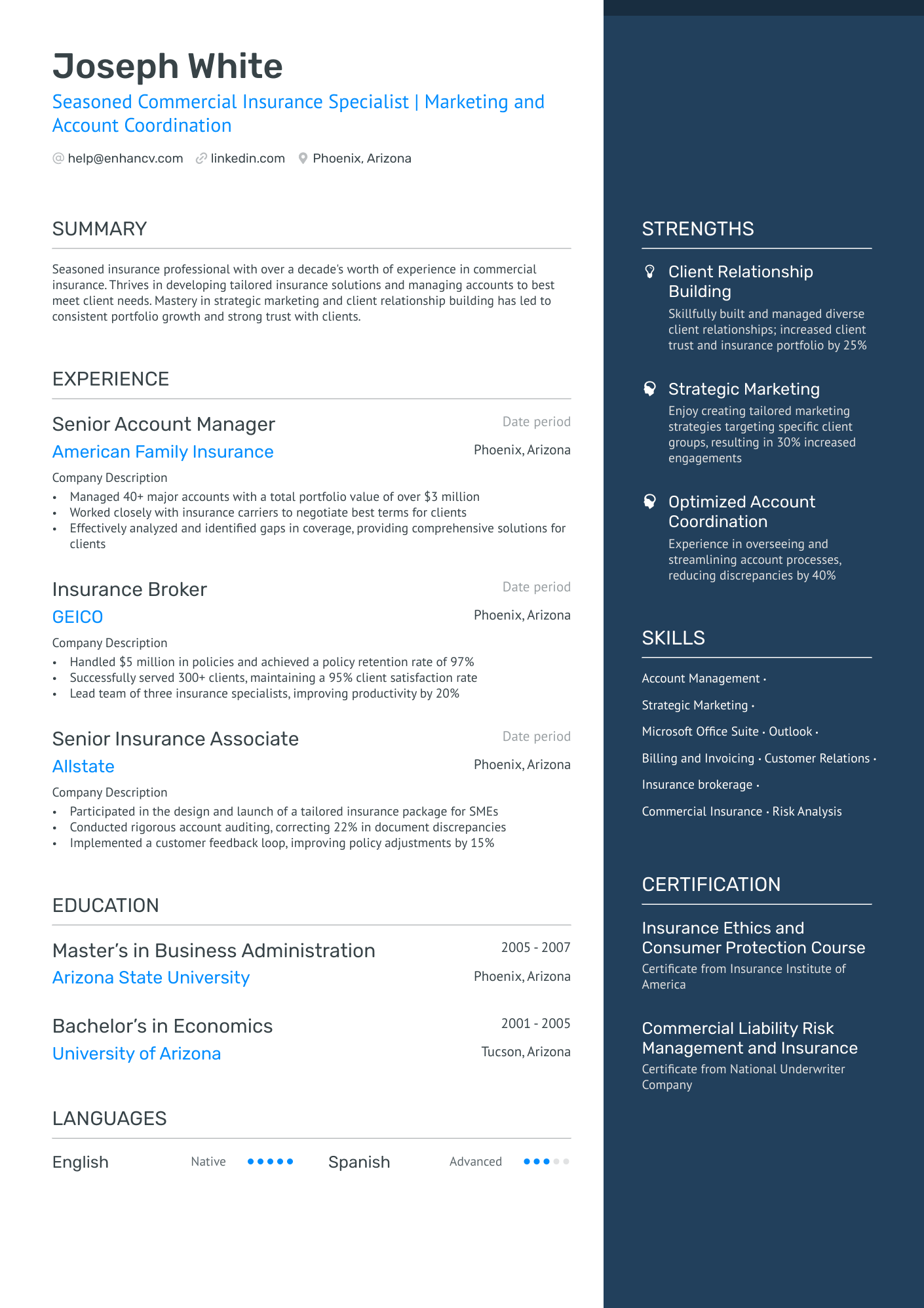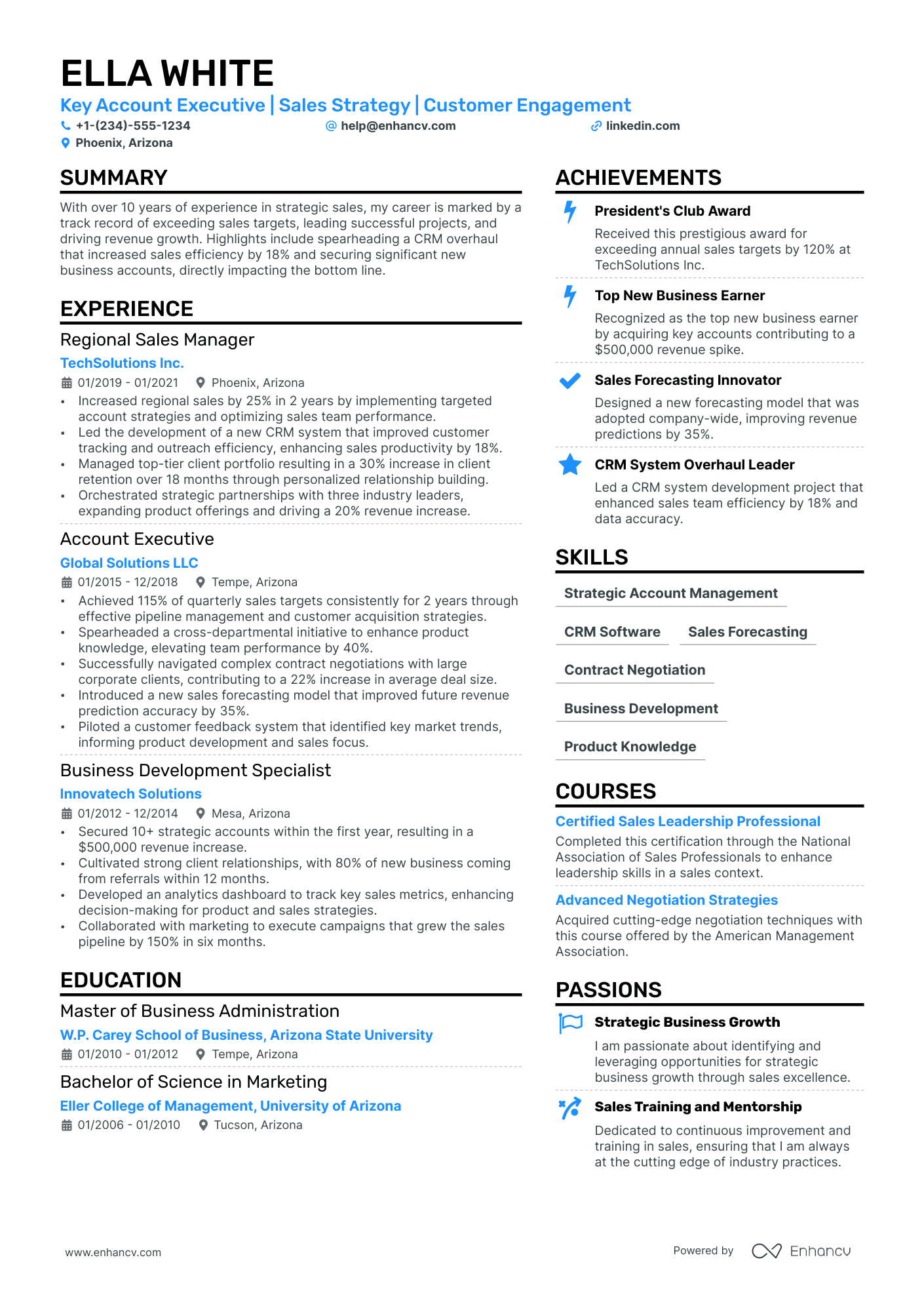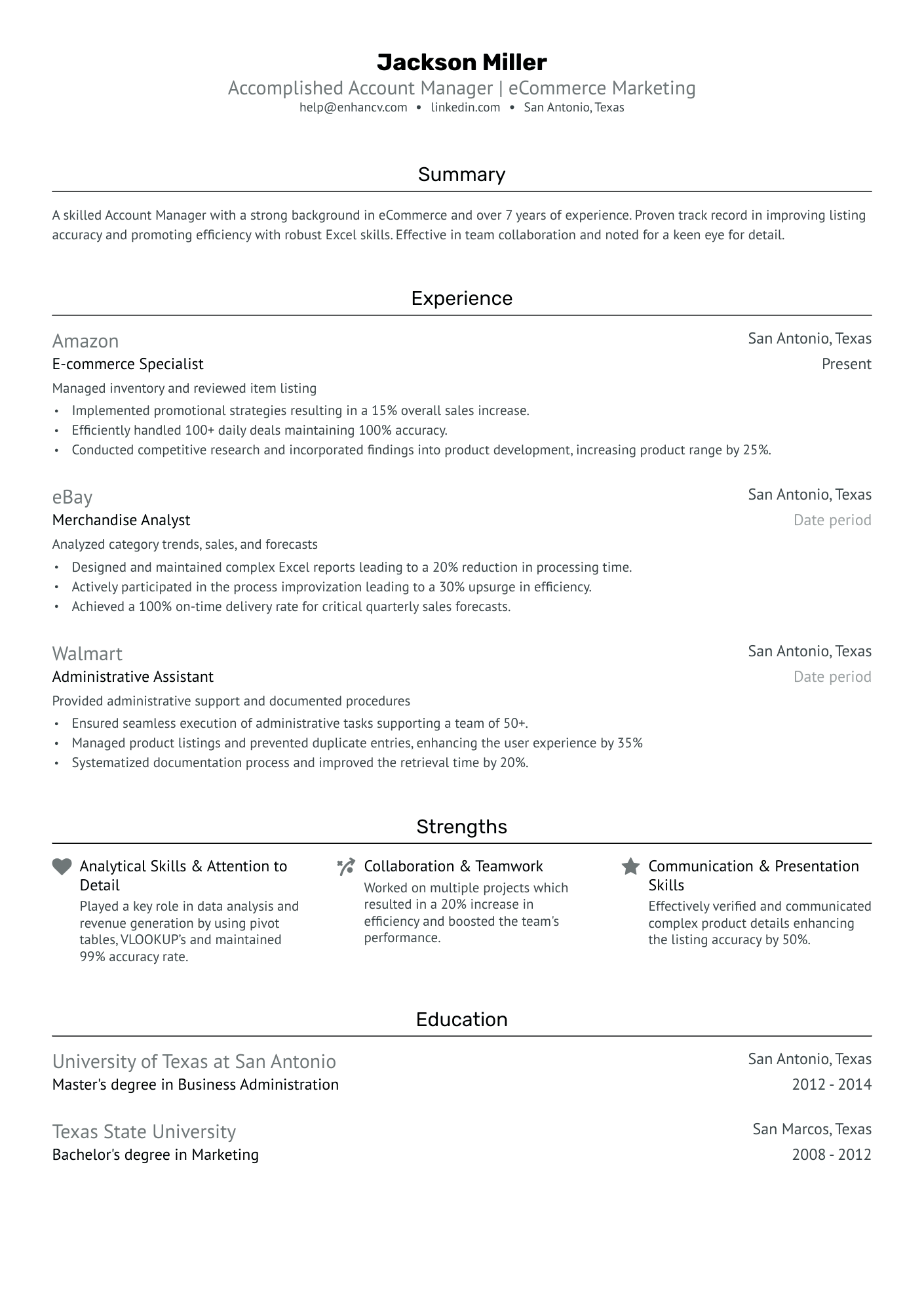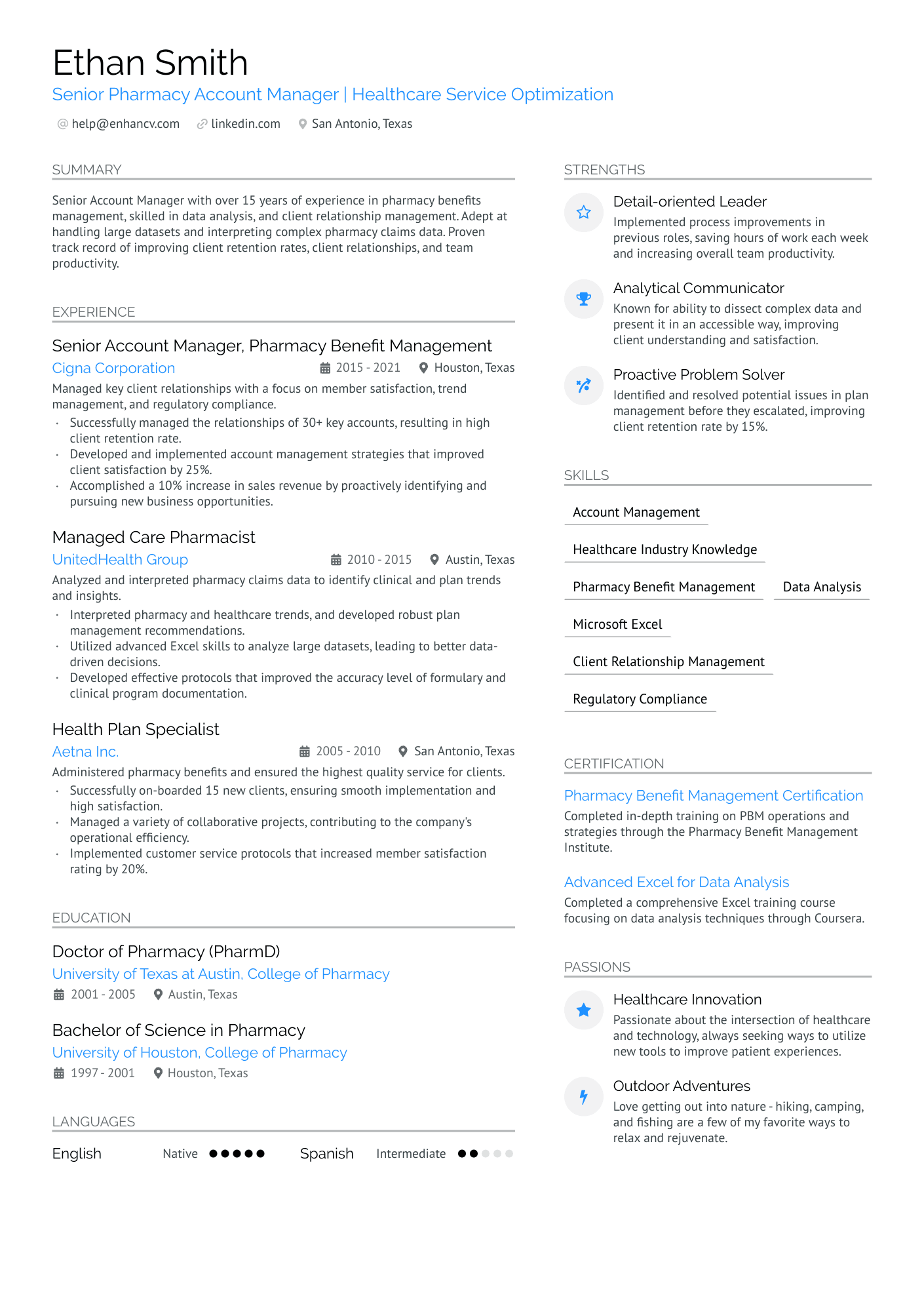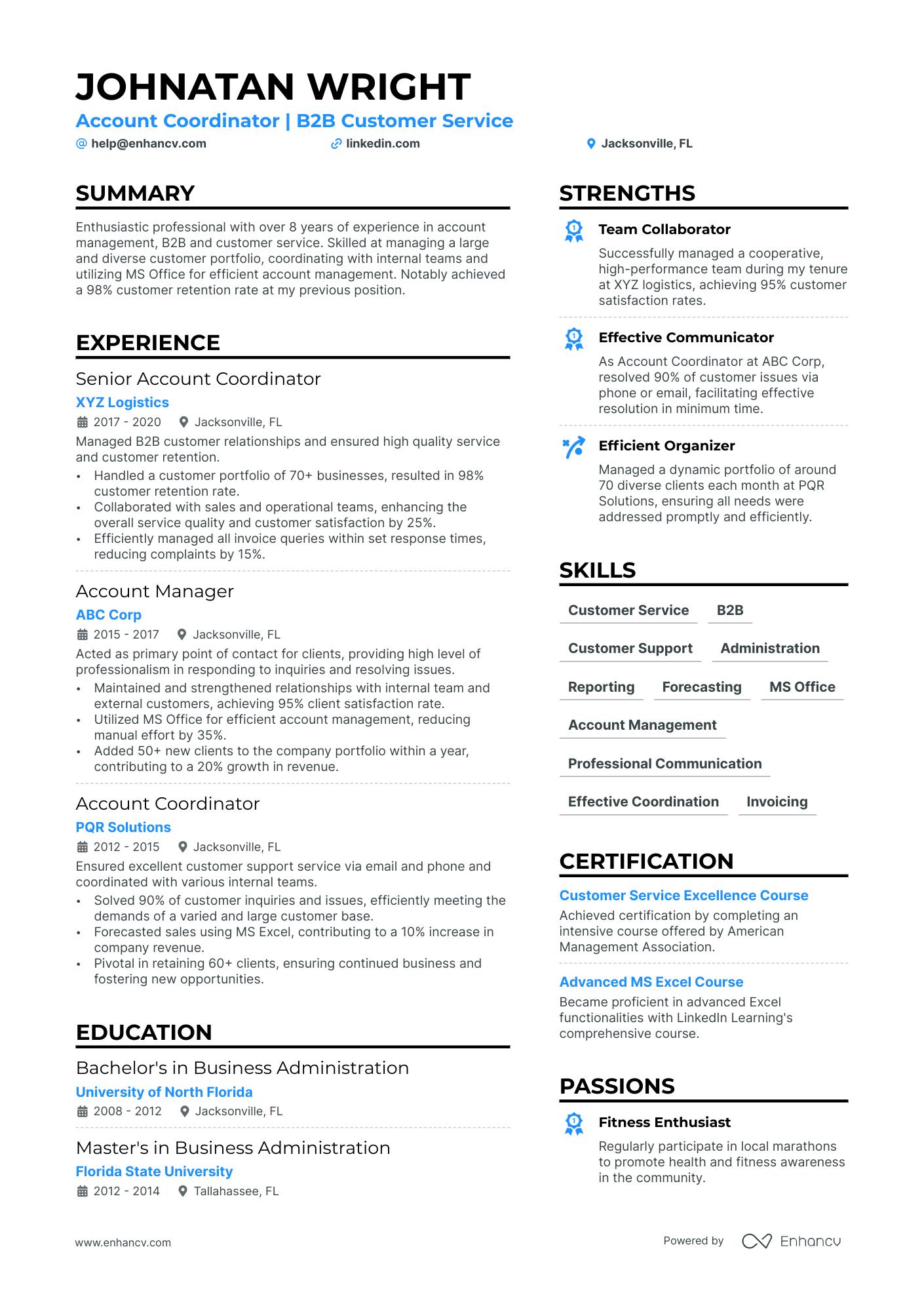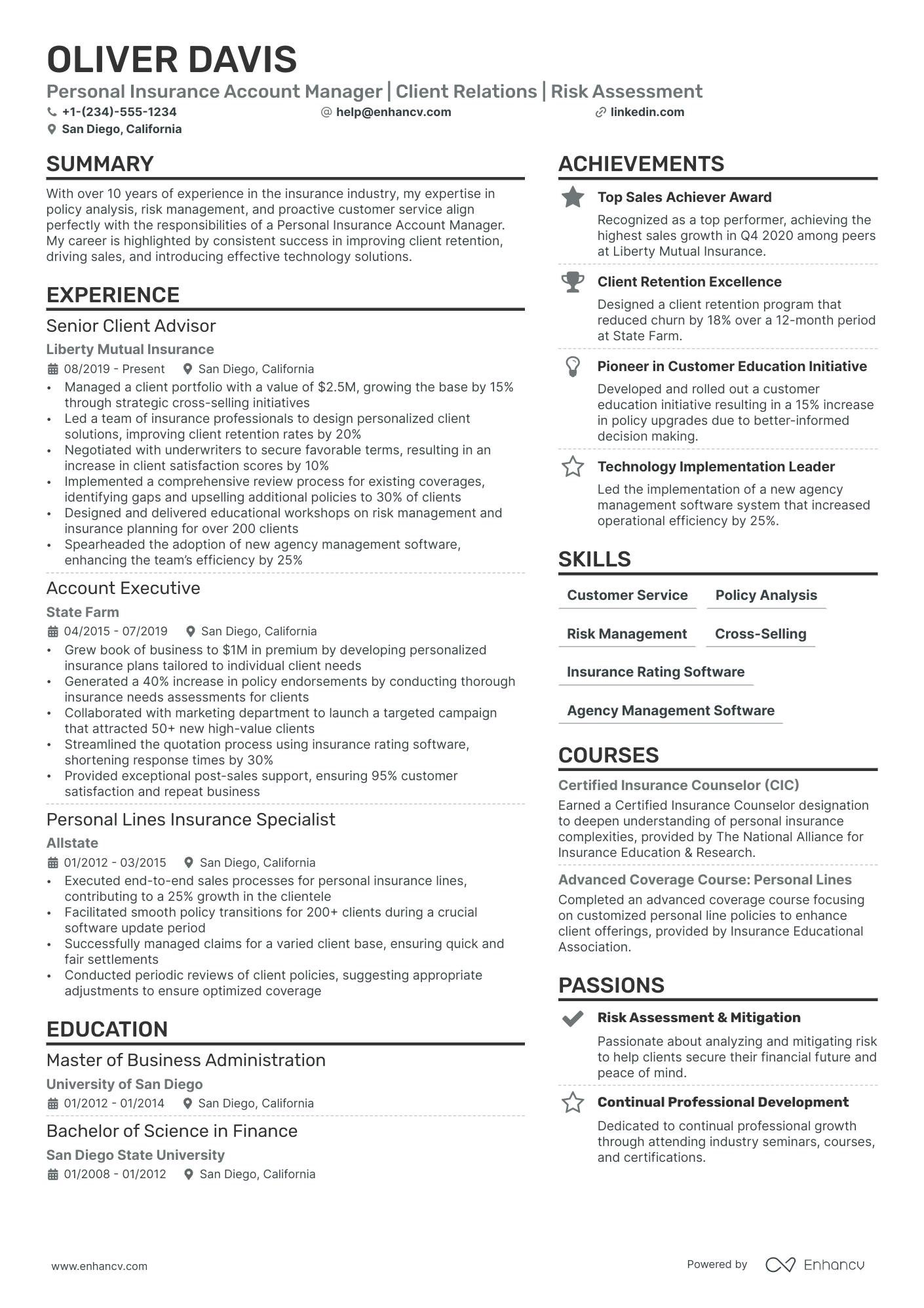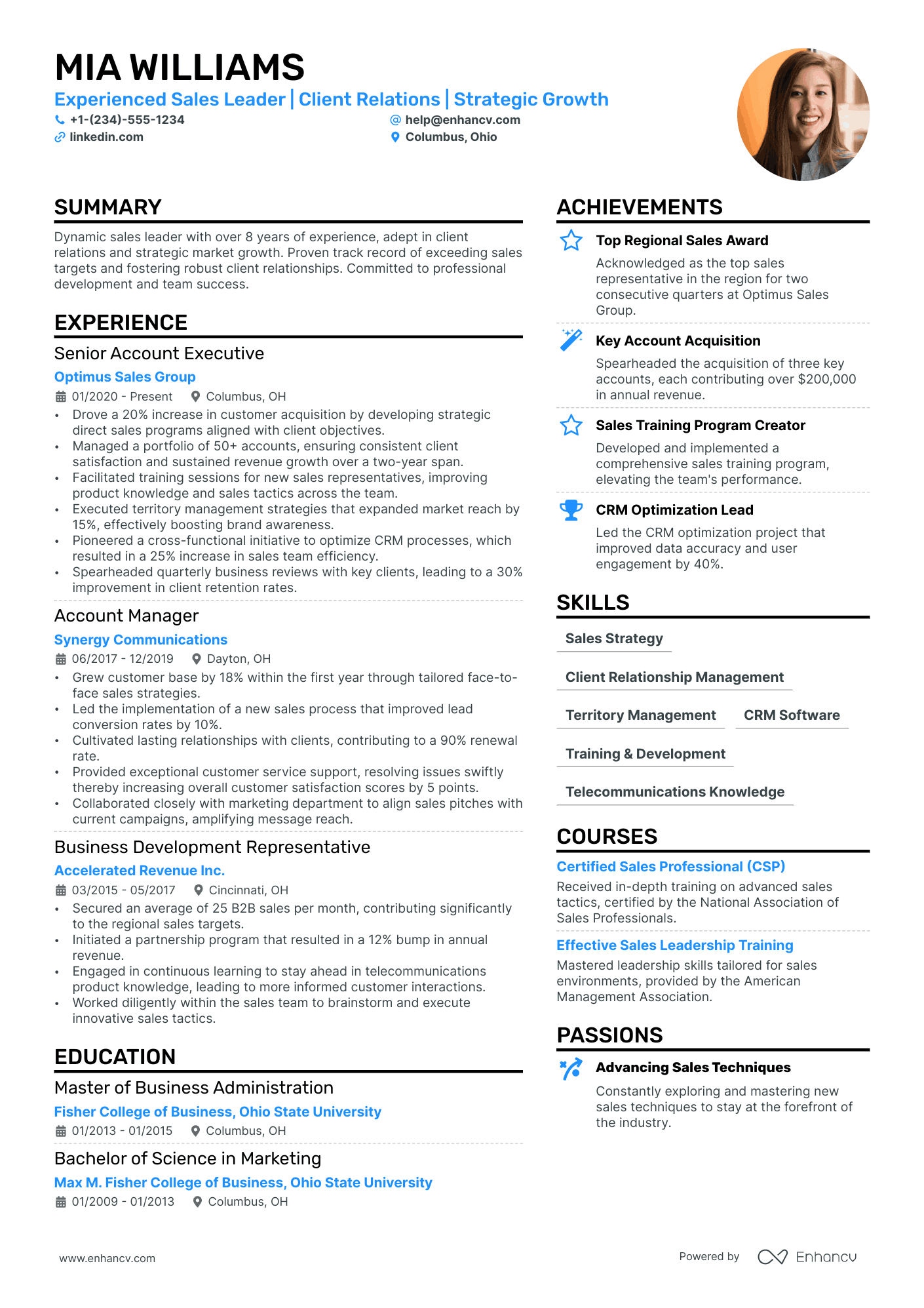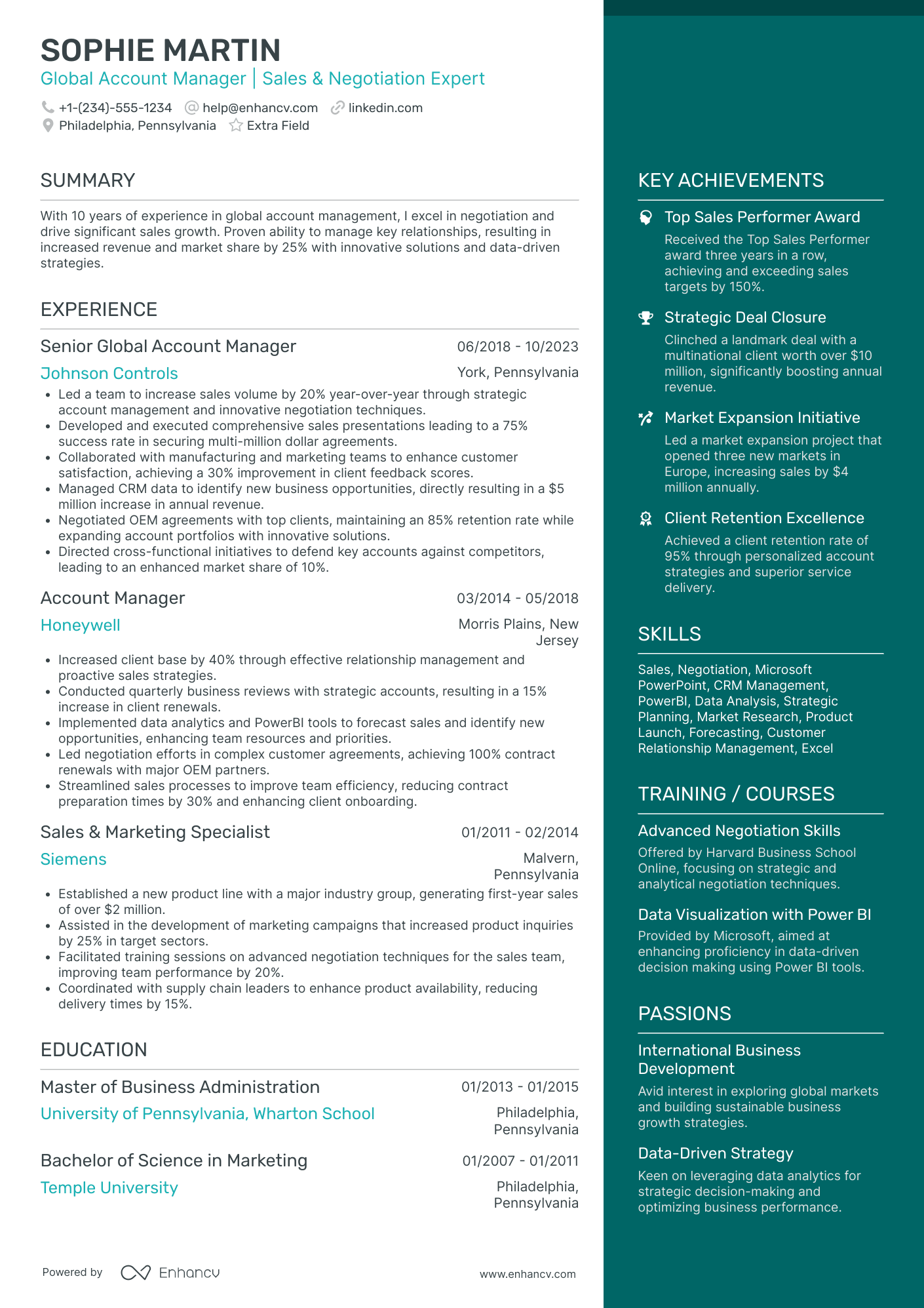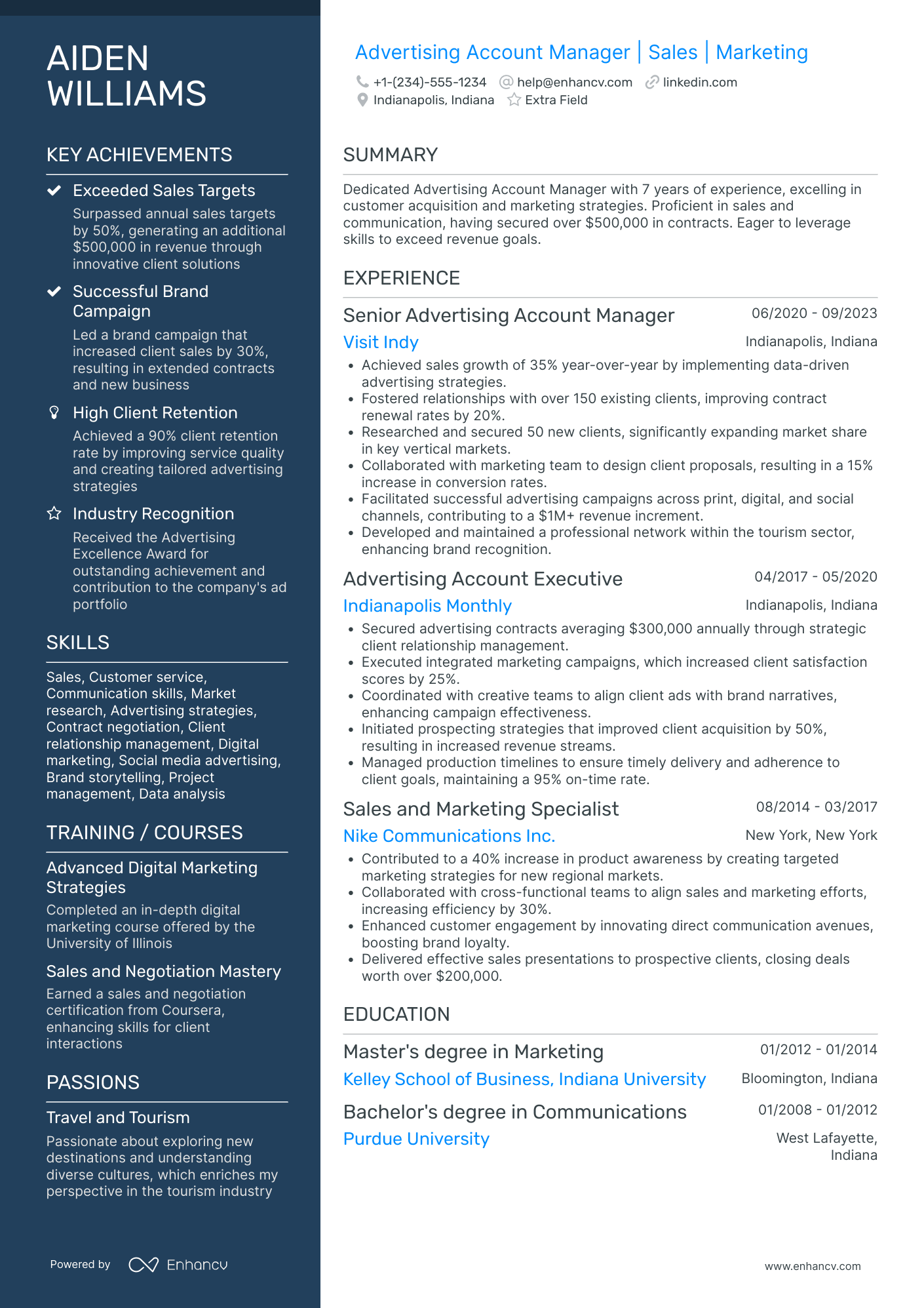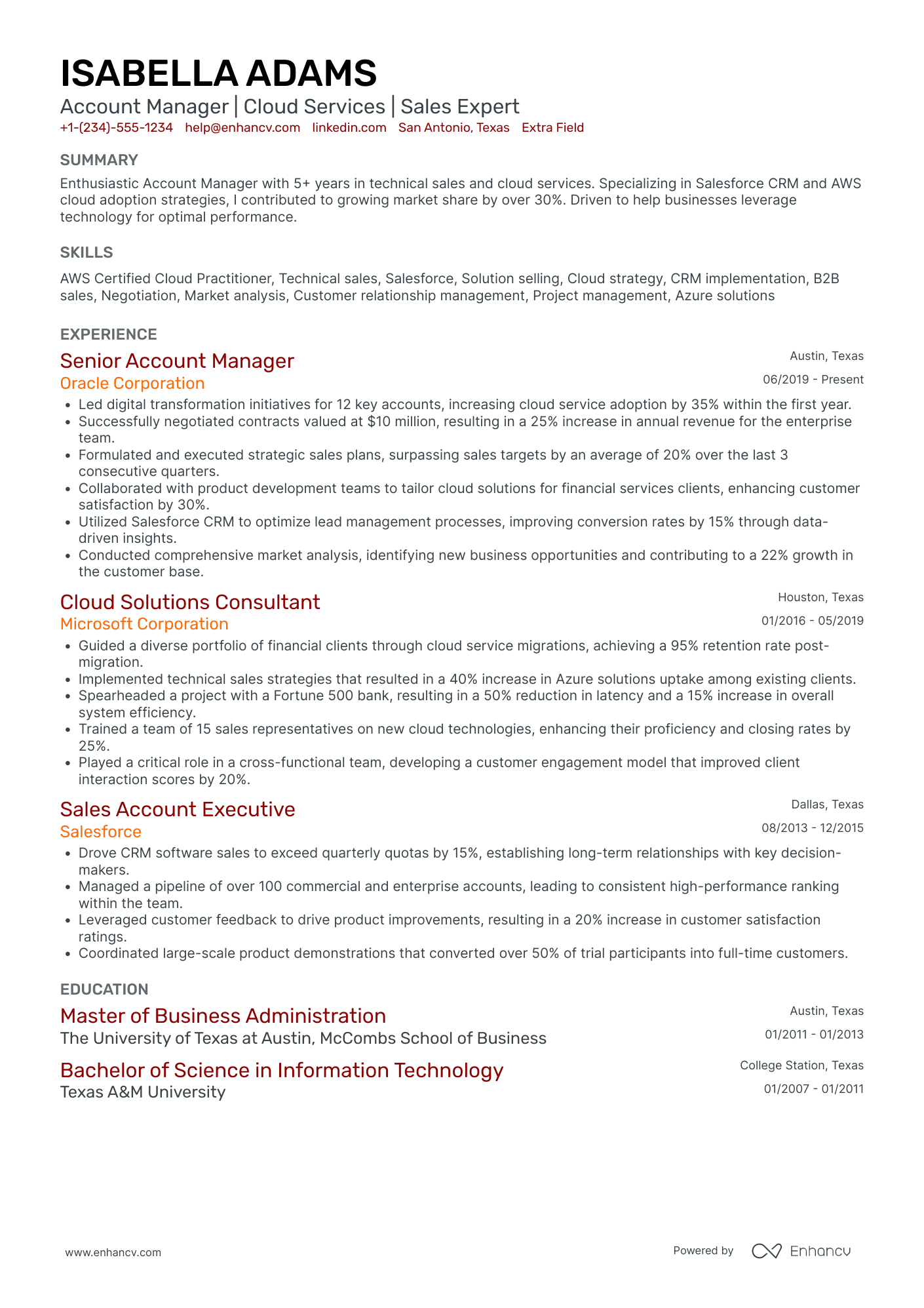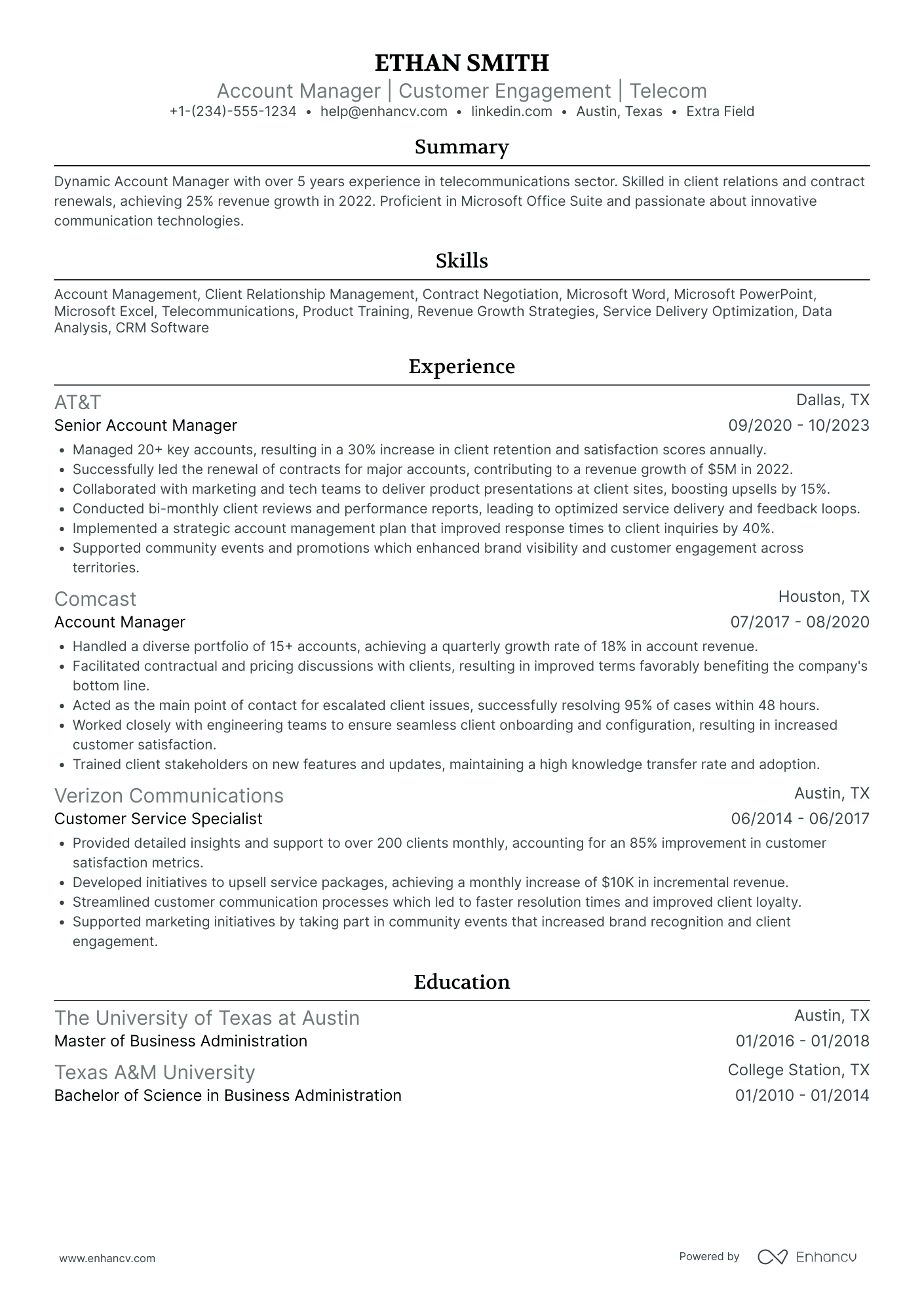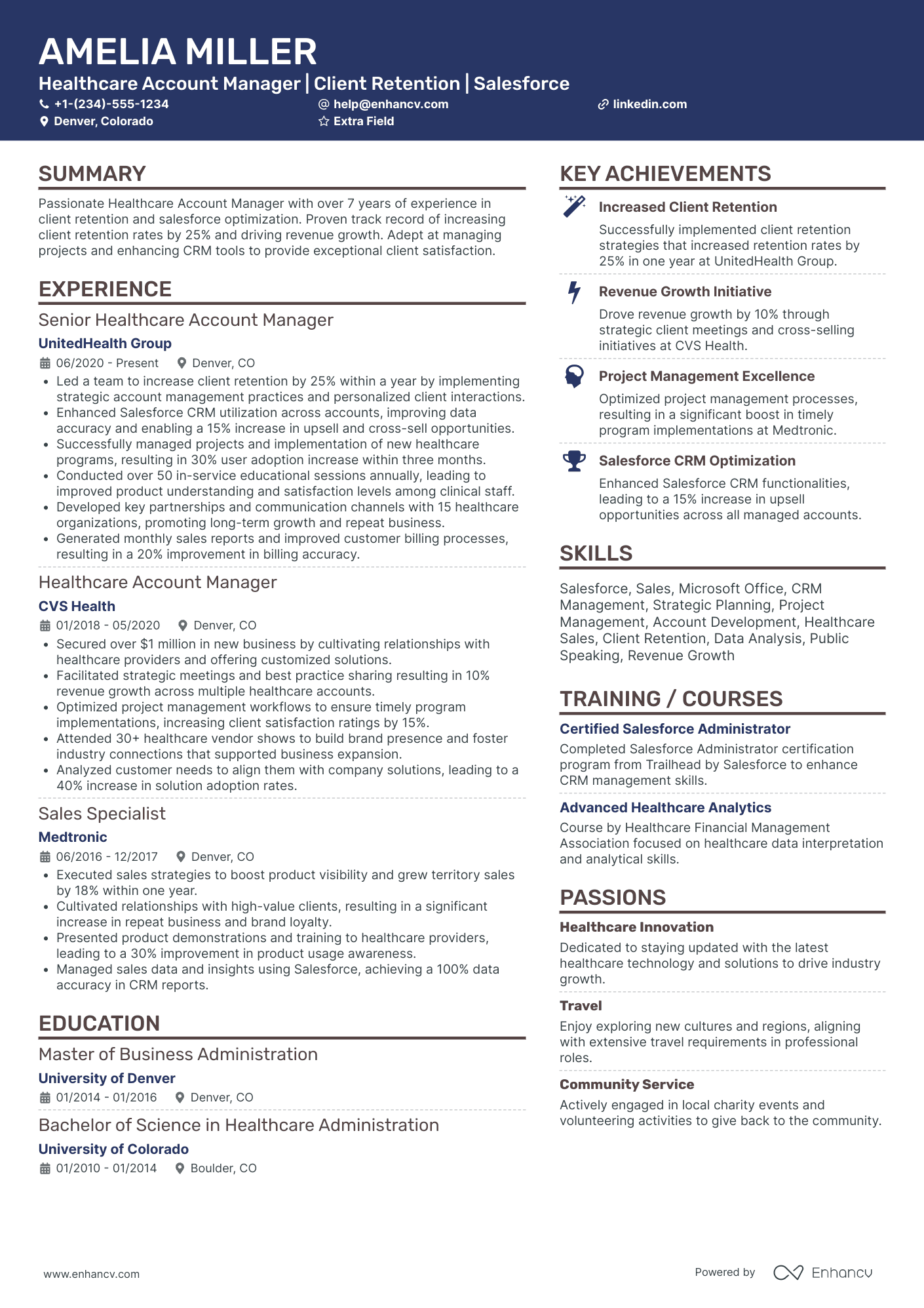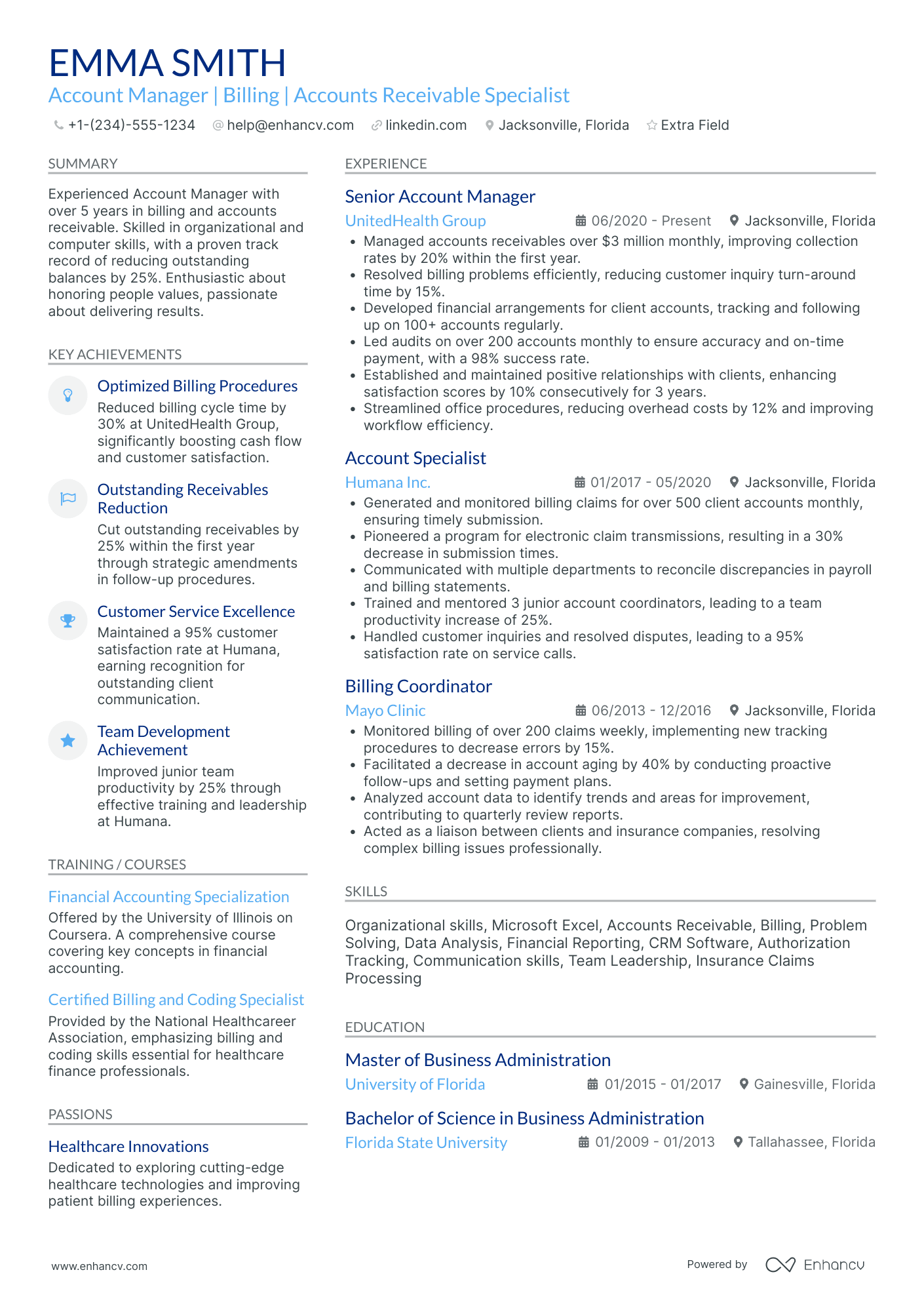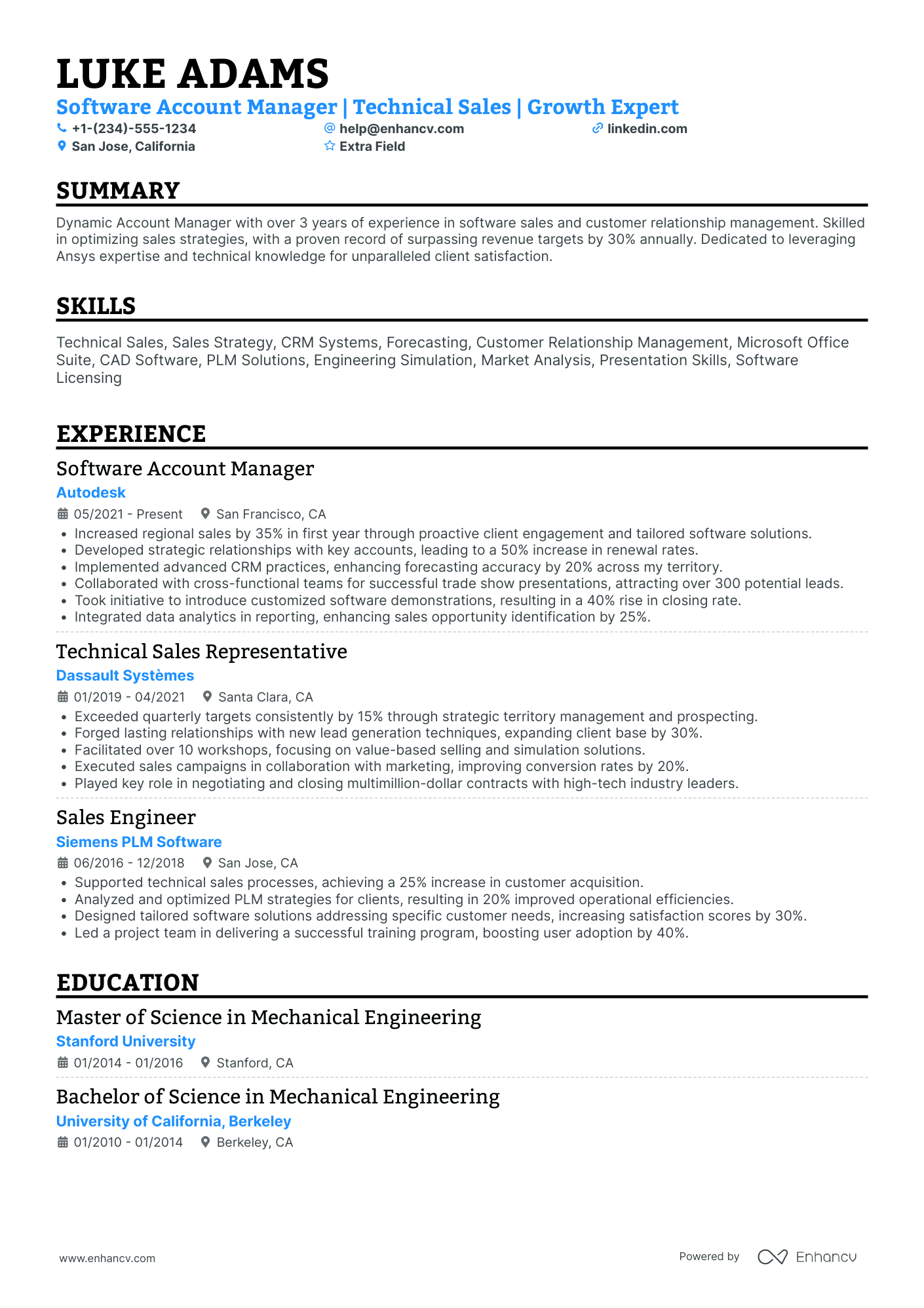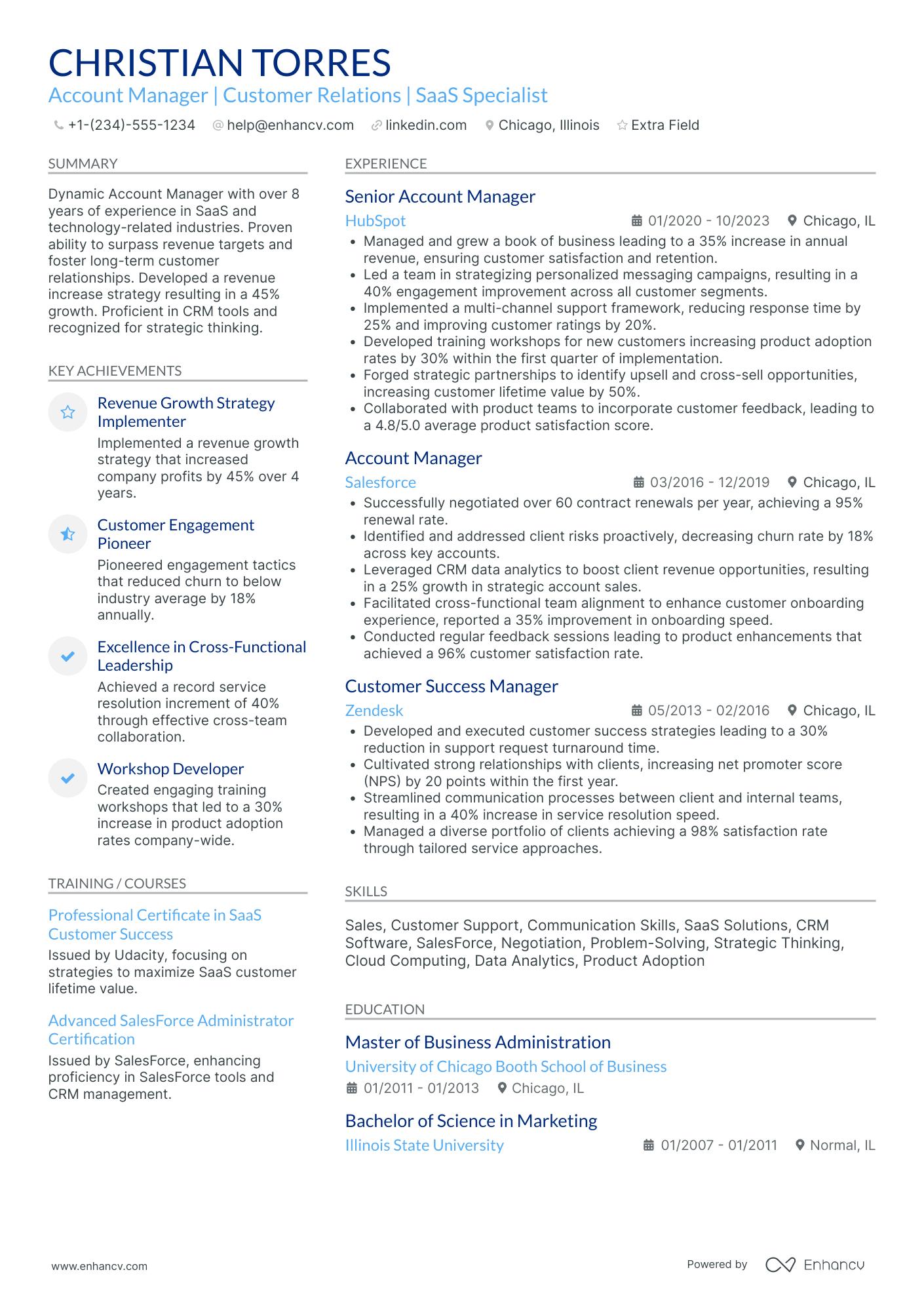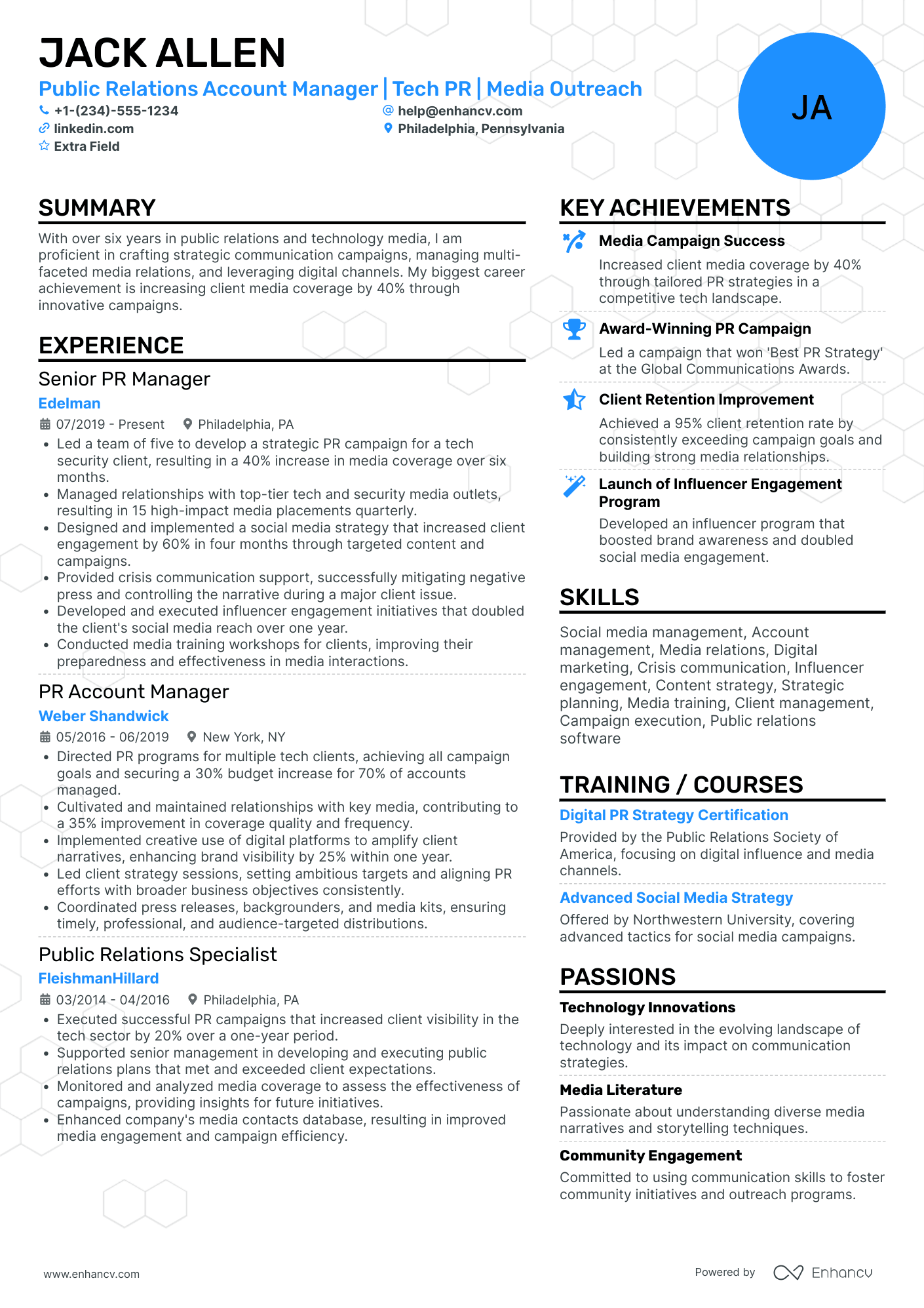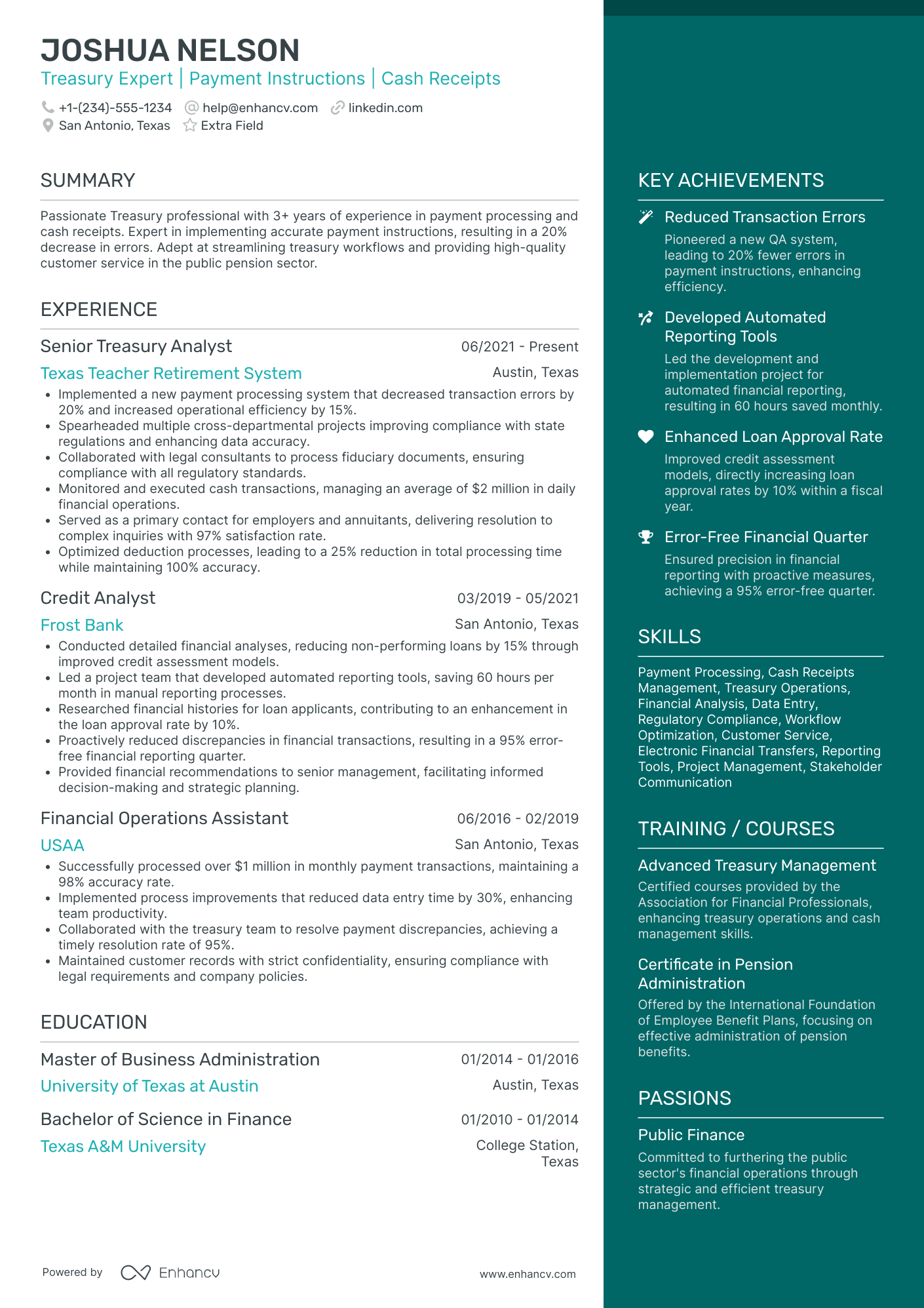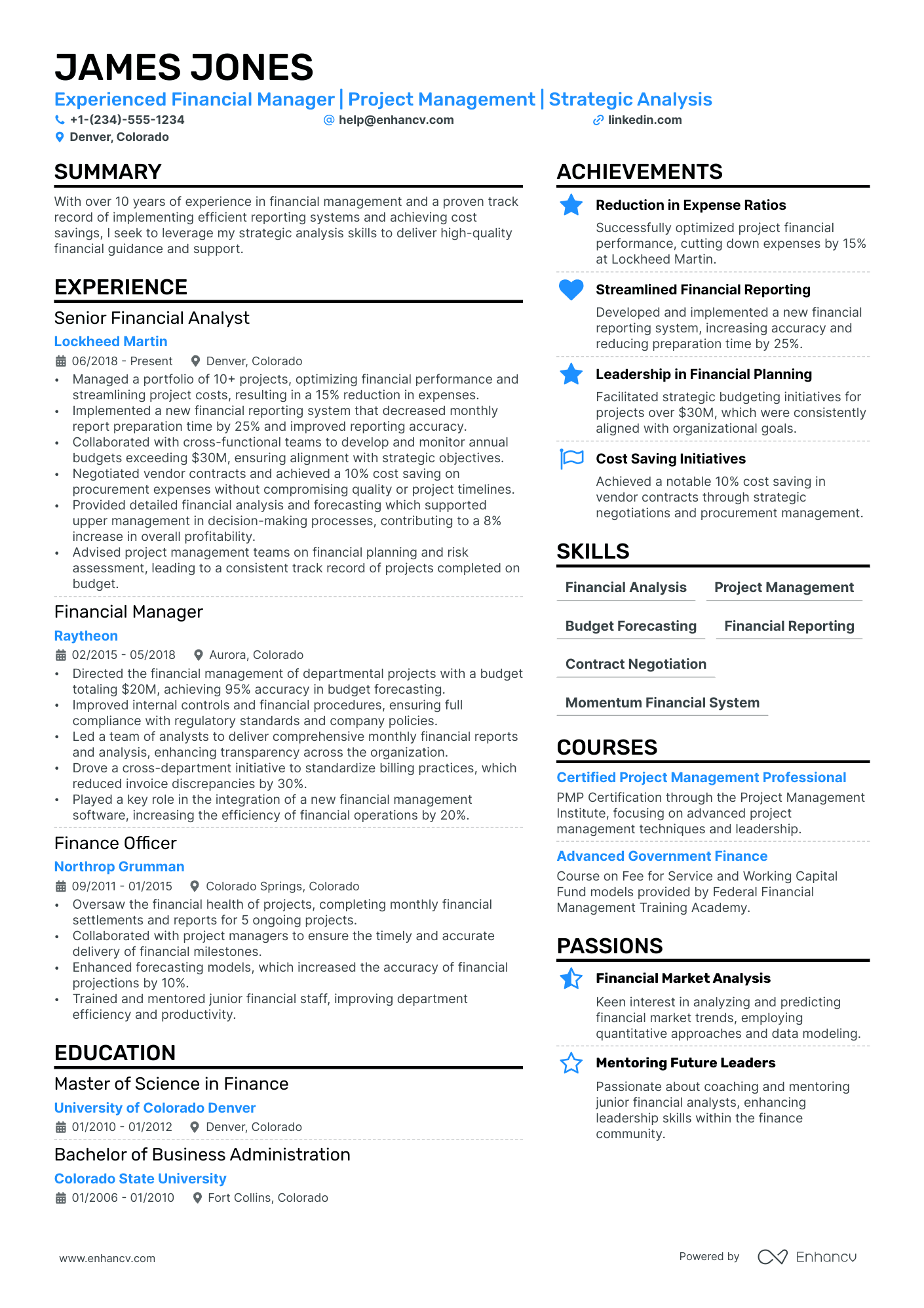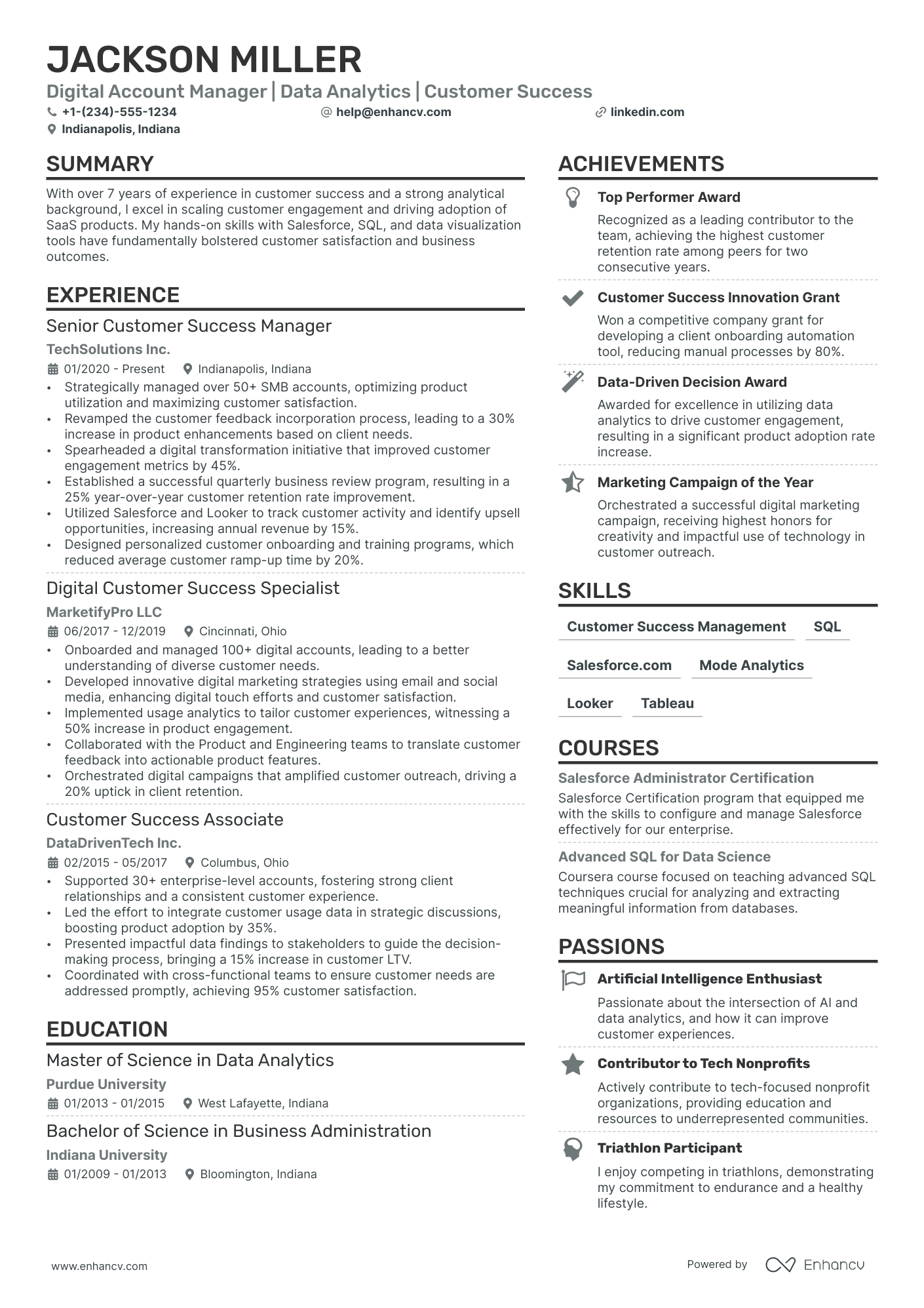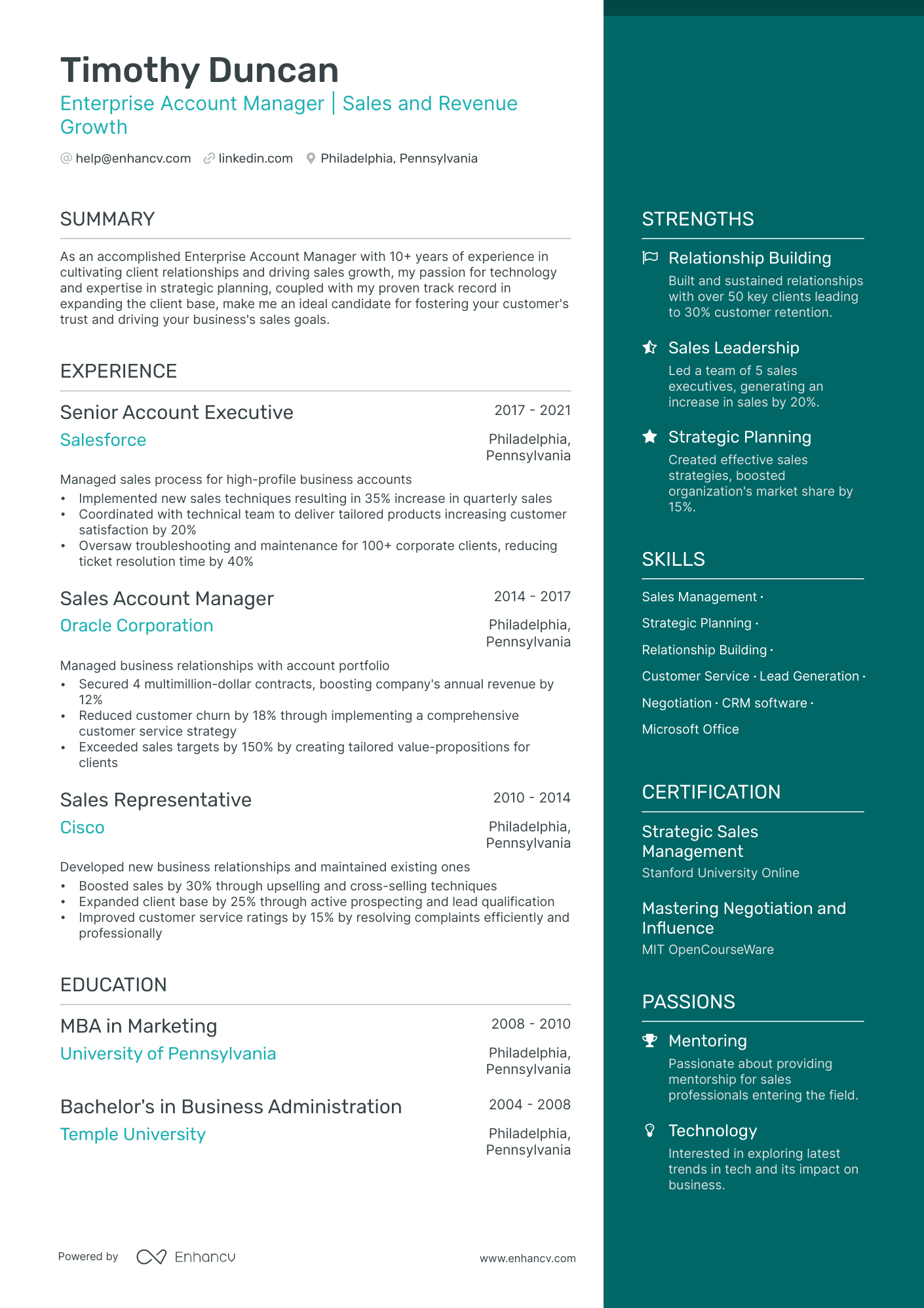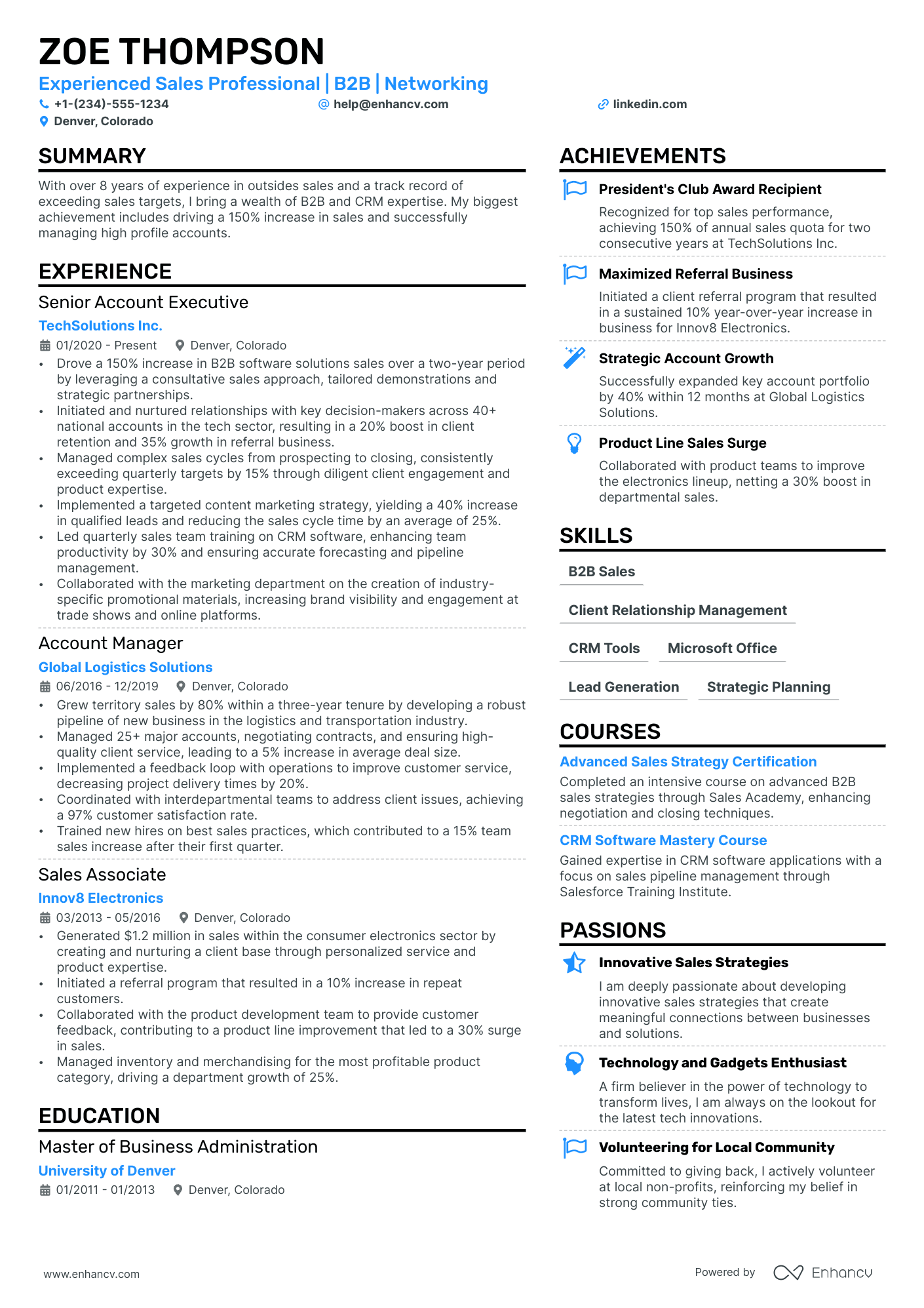An account manager is a client-facing role where you need to juggle client relationships, sales targets, project management, and even budgeting. It's a lot to handle, but it's also what makes the job exciting.
Providing excellent service keeps clients happy and loyal. However, spotting opportunities for upselling and cross-selling is key to driving growth. This means managing multiple relationships within each client's organization, navigating internal referrals, and maintaining strong connections at all levels.
Just like organizing your daily tasks, crafting your account manager resume is about pulling together your skills and experience in a cohesive way. Our guide will help you make a resume that illustrates your efficiency, keen eye for detail, and talent for navigating complex client relationships.
Key takeaways
- Offer a transparent overview of your career advancement as an account manager with a reverse-chronological layout.
- Design your resume with subtle tones and an attractive font to make it more noticeable.
- Emphasize your experience section by showcasing quantifiable accomplishments and concrete outcomes to engage hiring managers.
- Leverage metrics to illustrate the impact of your contributions.
- Include a section for your technical abilities, and weave your soft skills seamlessly throughout the resume.
- Underscore a pertinent educational background, which is essential and will always be valued.
Let's start with the fundamentals, covering the core principles for effective resume formatting.
Account manager resume sample
Adapt this AM resume sample or easily create a new one using the Enhancv resume builder.
Ella White
ella.white@email.com | LinkedIn | Fort Worth, Texas
Summary
Dynamic and detail-oriented account manager with over 3 years of experience in account management and client services within the ad tech and media industries. Skilled in campaign management, optimization, and data-driven insights to support advertiser success. Adept at collaborating with cross-functional teams to ensure seamless execution and post-sales processes. Passionate about customer success, data, and process improvement in a fast-paced sales environment.
Experience
account manager
Roku, Inc., Fort Worth, Texas
Jan 2020 – Present
- Serve as the primary point of contact for advertiser and ad agency relationships, overseeing campaign management and ensuring client satisfaction.
- Proactively manage renewal and up-sell opportunities, driving revenue growth and client retention.
- Collaborate closely with Ad Ops and Business Operations teams on campaign activations and optimizations.
- Monitor and report campaign status to key stakeholders, providing insights, screen grabs, and video captures.
- Ensure timely and efficient launch of client campaigns across all product offerings.
- Act as a liaison between clients, Roku creative services, and ad operation teams to support best practices and ad guidelines.
Account manager
Premium Publisher, Fort Worth, Texas
Jun 2017 – Dec 2019
- Managed display and video advertising campaigns for a portfolio of clients, ensuring optimal performance and client satisfaction.
- Developed and executed programmatic video campaigns, utilizing advanced targeting and optimization techniques.
- Provided regular campaign updates and insights to clients and internal stakeholders.
- Conducted in-depth analysis of campaign performance, identifying opportunities for improvement and upselling.
- Coordinated with creative teams to develop compelling ad assets that aligned with client goals.
Education
Bachelor of Arts in Marketing
University of Texas, Austin, Texas
Graduated: May 2017
- Relevant Coursework: Advertising and Promotions, Digital Marketing Strategies, Consumer Behavior, Marketing Research, Integrated Marketing Communications, Strategic Brand Management
Certifications
- Google Ads Certification
- Facebook Blueprint Certification
- Programmatic Advertising Certification (IAB)
Skills
- Campaign Management
- Client Relationship Management
- Data Analysis and Reporting
- Programmatic Video Executions
- Ad Tech Tools (Salesforce, Excel, PowerPoint, Tableau)
- Cross-functional Collaboration
- Project Management
- Upselling and Revenue Growth
Languages
- English (Fluent)
- Spanish (Intermediate)
How to format an account manager resume
Choosing the right resume format makes your work history clear and accessible to recruiters. For an account manager, a simple and stylish resume layout is ideal. Modern designs can be a canvas for your project organization skills and professionalism, which are highly valued traits for this role.
Resume format
The professional look of the reverse-chronological order is the best choice for AM positions. Start with your most recent job and work backward, clearly showing your experience. This format is perfect for account managers with a steady career, underlining your progression and relevant skills.
Here's the recommended order for your resume sections, which we’ll discuss in detail:
- Header
- Summary/Objective
- Professional experience
- Education
- Certifications
- Key skills
- Languages
The clear and logical structure of this format makes it a recruiter favorite.
Let's take a closer look.
Resume designs
- We advise setting your resume with 1-inch margins on every side and opting for a two-column layout to maintain a neat and structured appearance that’s easy to follow.
- Opt for professional typefaces such as Arial or Rubik, with a font size ranging from 10 to 12 points.
- To give your resume a refined and professional edge, consider implementing subtle colors like dark blue, gray, or dark green.
- Keep your resume to a single page if your experience is under ten years. However, account managers with more experience might create a two-page resume.
Contact information
- Verify that your name is spelled correctly and consistently across all your application documents.
- Ensure the job title on your resume mirrors the one you’re seeking. If the position is listed as account manager, make sure to use that specific title to simplify the hiring process.
- Highlight your primary expertise in account management with a strong resume headline. Include a professional email address and add a link to your current LinkedIn profile if it’s up-to-date.
- Provide a link to your portfolio, outlining key clients you've worked with or links to TV and print campaigns if relevant.
- Adhere to U.S. resume standards by omitting any photos to avoid potential bias.
File format
- When naming your resume, use a clear and professional format like "EllaWhiteResumeAccountManager.pdf," and save it as a PDF file unless the job listing requests another format.
- Double-check your resume for correct punctuation and consistent formatting, as these factors can impact how applicant tracking systems read your document.
Different markets have specific resume styles – a Canadian resume, for instance, may require a different approach.
Take advantage of our free AI-powered resume checker to see how your resume performs with an ATS.
Is your resume good enough?
Drop your resume here or choose a file. PDF & DOCX only. Max 2MB file size.
Now that your resume format is set, let’s work on detailing your account management expertise.
How to write your account manager resume experience
When creating your account manager work experience section, it's crucial to spotlight your skills in client relations and project management. Here’s how to do it:
- Focus on your latest and most impactful roles at the top.
- Point out job titles, company names, locations, and employment dates for each role.
- Use action verbs like “managed,” “developed,” and “coordinated” to show initiative.
- Feature your achievements with specific metrics and bullet points.
- Tailor your resume to align with the job offer, showing recruiters that you're an ideal candidate.
The right way to tailor your account manager resume to the job description
Tailoring your resume to match the job description puts your key qualifications for an account manager role front and center. This method helps you stand out and increases your chances of catching the hiring manager's eye.
By highlighting the specific skills and experiences needed for the position, you show why you're the perfect fit.
Creating a targeted resume requires a careful approach. Look at the example below to learn how.
Account manager
Responsibilities:
- Own overall relationships with customers, identifying key stakeholders, and building relationships with influencers and the core team interacting with our solutions
- Manage partnership, commercial, and technical initiatives; develop and implement strategies that increase existing and new product adoption, engagement, and growth at scale to drive revenue
- Lead key partnership initiatives including ongoing checkpoints, quarterly business reviews, and technical escalations; identifying critical goals and key performance indicators to clearly understand and measure client satisfaction
- Be a strategic advisor and provide consultative guidance on Plaid and industry best practices as customers build and scale their applications
- Enable successful and consistent renewals to maintain existing segment revenue, as well as identify and execute on new growth opportunities with customers in support of the Sales team
- Be a champion for our customers and work with our internal Plaid teams to translate customer feedback into product insights; partner with key customer stakeholders to ensure alignment between their business and product priorities and Plaid’s
- Partner and collaborate with internal cross-functional counterparts such as Account Executives, Sales Engineers, Technical Support, Legal, Engineering, and Product teams to drive successful outcomes for Plaid and our customers
Qualifications:
- 7+ years of relationship management experience with large organizations or strategic customer portfolios in financial services or technology industries
- Ability to partner with Sales teams to drive successful outcomes for Plaid customers; previous deal experience strongly preferred
- Ability to collaborate closely with Plaid’s technical teams to ensure customer application launches are timely and successful; previous B2B technology experience is a strong plus
- A strong business generalist with an acute product sense and ability to drive revenue growth
- Ability to quickly understand new technologies and complex concepts
- Ability to solve complex customer challenges through creative problem-solving and collaboration with cross-functional teams
- Interest in financial services and technical products; grit, enthusiasm, and a high degree of intellectual curiosity
Here’s how we’ve customized this section for the role.
- •Managed relationships with key customers, identifying stakeholders and building strong connections.
- •Increased product adoption by 25% through strategic initiatives and customer engagement.
- •Led partnership initiatives, resulting in a 20% increase in customer satisfaction scores.
- •Provided strategic advice on best practices, enhancing customer application scalability by 30%.
- •Achieved a 95% renewal rate, maintaining revenue and identifying new growth opportunities.
- •Translated customer feedback into product insights, aligning with business priorities and increasing user satisfaction by 15%.
This account manager resume is a strong example because it addresses the job requirements through the following points:
- Emphasizes managing relationships with key customers, identifying stakeholders, and building strong connections, which are core duties for an account manager.
- Quantifies achievements by stating a 25% increase in product adoption, a 20% increase in customer satisfaction scores, a 95% renewal rate, and a 15% increase in user satisfaction.
- Highlights strategic initiatives, customer engagement, and collaboration with cross-functional teams, all critical skills for the role.
- Begins each bullet point with action verbs such as "Managed," "Increased," "Led," and "Provided," conveying a sense of agency and initiative.
- Tailors the bullets to reflect the responsibilities and expectations of the account manager position, ensuring relevance.
- Structured clearly, making it easy for recruiters to identify the candidate's key strengths and accomplishments.
The section that follows includes samples for achievements with specific metrics and results.
How to quantify your experience on a resume
As an account manager, demonstrating your impact with tangible, measurable results is key. Focus on specific accomplishments like revenue boosts, improved customer retention, and successful project completions to showcase your proficiency.
Each bullet point should convey the overall impact of your work and its value to the company or clients you’ve worked with. When detailing your experience in account management, focus on these quantifiable aspects:
- Increase revenue by 30% within the first year through strategic account management.
- Boost customer retention rate by 20% by implementing personalized engagement strategies.
- Drive a 25% growth in product adoption by coordinating targeted marketing campaigns.
- Reduce client churn rate by 15% by resolving issues quickly and improving satisfaction.
- Enhance client portfolio value by 40% through effective upselling and cross-selling techniques.
These guidelines are helpful even if you're new to account management. The following section contains tips to boost your entry-level account manager resume.
How do i write an account manager resume with no experience
Becoming an AM without direct experience might seem challenging, but it's entirely possible with the right approach.
To get started, follow these steps:
- Opt for a functional resume format to prove your skills and educational achievements.
- Choose a creative template to demonstrate a visionary and original look even with limited experience.
- Include a degree in business, marketing, or a related field to build a strong foundation.
- Gain practical experience through internships in sales, customer service, or marketing roles.
- Obtain relevant certifications, such as account management or sales courses, to enhance your credentials.
- Highlight transferable skills like communication, problem-solving, and project management on your resume.
- Undertake personal projects or volunteer work that involves client interaction and management to demonstrate your capabilities.
Resume objective for entry-level bankers
When you’re putting together a resume for an entry-level account manager role, your objective statement is really important. It’s your opportunity to show your career goals and excitement about starting in this field, even if you don’t have much experience yet.
Here’s how to write a strong objective statement:
- Talk about your career goals or the specific account management job you’re aiming for.
- Make it personal to the role and the company, using keywords and phrases from the job ad to show you’re a great match.
- Underscore key skills or qualifications that make your resume stand out to hiring managers.
- Explain how your skills can help the company grow and succeed.
Let’s take a look at an example of a successful objective statement.
Now that we've outlined your career, let's talk about your account management skills.
Optimize your resume summary and objective for ATS
Drop your resume here or choose a file.
PDF & DOCX only. Max 2MB file size.
Account manager resume skills
It's important to include both hard and soft skills in your account manager application. A balanced skills section on your resume proves that you’re great at managing client relationships and know how to work well with your team to keep customers happy.
Your technical skills really matter when it comes to impressing recruiters. It’s a good idea to create a separate section just for your hard skills. This is where you can highlight your expertise in CRM software, project management, and sales strategies.
Here’s a simple way to look at it:
- Hard skills are the technical abilities that you’ve honed through experience and training. These might include managing client accounts, analyzing market trends, executing sales strategies, and working with data.
- Soft skills are all about how you interact with others and handle different situations. This includes communicating clearly with clients, working well in a team, coordinating with other departments, and solving problems on the fly.
Here’s a list of hard skills you might want to include in your resume’s skills section:
Best hard skills for your account manager resume
- CRM Software (e.g., Salesforce)
- Microsoft Excel
- Microsoft PowerPoint
- Google Analytics
- Tableau
- HubSpot
- Zoho CRM
- Trello
- Asana
- Slack
- LinkedIn Sales Navigator
- QuickBooks
- Marketo
- Mailchimp
- Pipedrive
- Basecamp
- Zendesk
- Dropbox
- Google Workspace
To catch the attention of recruiters, weave people skills into your resume, particularly in the summary or experience sections where their impact can be highlighted and quantified. For instance, you might say: "Effectively communicate with clients and colleagues, boosting customer satisfaction by 20%."
Best soft skills for your account manager resume
- Problem-solving
- Communication
- Multitasking
- Teamwork
- Decision making
- Conflict resolution
- Adaptability
- Negotiation skills
- Customer service
- Relationship building
- Strategic thinking
- Attention to detail
- Leadership
- Time management
- Empathy
- Active listening
- Persuasion
- Organizational skills
- Initiative
- Collaboration
Let's explore the best way to present your education and certifications on an account manager resume.
How to list your certifications and education on your resume
In your resume’s education section, emphasize the essential skills and knowledge you've acquired for account management. Ensure this part of your resume is tailored to the job description, just like your work experience. Employers look at this section to verify that your education supports your listed skills.
Key elements to include in your education section:
- Degree in Business, Marketing, or a related field
- University name
- Graduation date
- Relevant coursework such as Sales Strategies, Customer Relationship Management, Market Analysis, and Project Management
- Honors and awards related to business or marketing achievements
Here’s an example:
- •Completed coursework in Sales Strategies, Customer Relationship Management, Market Analysis, and Project Management.
- •Participated in the Business Club and served as the Vice President.
This example impresses because:
- Includes a Bachelor's Degree in Business Administration from Harvard University, showing a strong educational background relevant to account management.
- Lists degree, institution, location, and date range for a complete educational history, providing clarity and completeness.
- Features relevant coursework that directly relates to the skills needed for account management.
- The applicant participated in the Business Club and served as the Vice President which demonstrates leadership and extracurricular involvement.
Strengthen your account management resume with a solid certifications section. Certifications, even if not required, can boost your credentials and career prospects.
If you're currently pursuing a certificate or degree, include the expected graduation or certification date.
Best certifications for your account manager resume
In the next part, we’ll show you how to emphasize your account management strengths in a resume summary.
How to write your account manager resume summary
On an account manager’s resume, the summary provides a quick overview of your career success. It aims to capture HR's interest by showcasing the most important aspects of your professional history.
- Improve your summary with these practical resume tips:
- Showcase your years of experience in account management to prove your expertise.
- Focus on key skills relevant to the job, like client relationships, sales tactics, and project management.
- Quantify your achievements to give solid proof of your contributions.
- Tailor your summary to align with the job description, showing why your background makes you an ideal candidate.
Give this example a look—it’s pretty great.
This summary is effective because it reflects the key requirements from the job description, emphasizing relevant experience and qualifications. Additionally, it ensures your resume will be filled with terms and keywords that align with the job listing.
Next, let's look at the additional sections that can further improve your account manager resume.
Additional sections for an account manager resume
Optional sections in a resume for account managers can show a broader range of skills and experiences, setting you apart by highlighting unique aspects of your professional journey. Here’s a list of top resume additions:
- Awards and achievements: Include any industry or academic honors you've earned, underlining your excellence and acknowledgement in the field of account management.
- Hobbies and interests: Reflect on your personality and suggest a well-rounded character, potentially aligning personal passions with industry trends and innovations.
- Professional affiliations: Show your participation in the account management community, boosting your credibility and demonstrating continuous professional growth.
- Language skills: Demonstrate your proficiency in multiple languages, which is beneficial in handling diverse client portfolios and international projects.
In conclusion
Writing a resume for an account manager needs clarity and accuracy. Focus on your attention to detail and proficiency in client management. Ensure it demonstrates your ability to manage intricate accounts, positioning you as a trustworthy asset to any team.
Account Manager resume examples
By Experience
By Role
